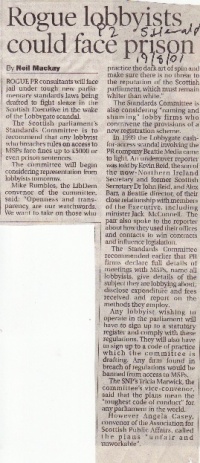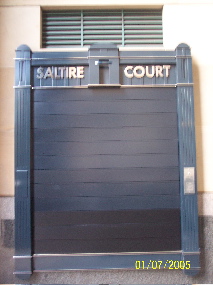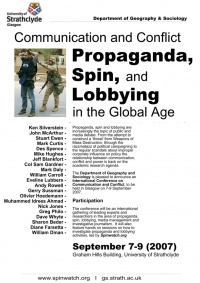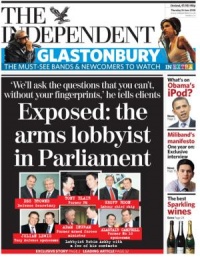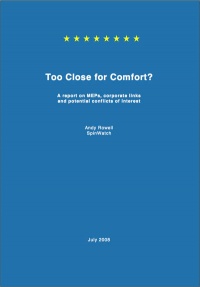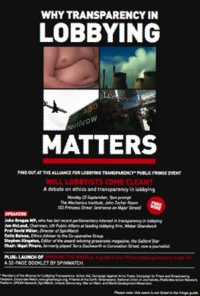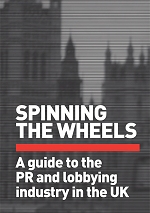Lobbying regulation - chronology 2000-2009

|
This article is part of the Lobbying Portal, a sunlight project from Spinwatch. |
This page lists the history of debates on Lobbying regulation, in Scotland, the UK, the EU and the US.
See also:
- Lobbying regulation - chronology 1920s-1980s
- Lobbying regulation - chronology 1990-1999
- Lobbying regulation - chronology 2010-2019
- Lobbying regulation - chronology 2020-2029
2000 - 2009
2000
January 12th
UK: The Sixth Report, ‘Reinforcing Standards – A Review of the First Report of the Committee on Standards in Public Life’, is published by the Committee on Standards in Public Life.[1]
October 25th
Scotland: The Standards Committee issues its first consultation paper Lobbying in the Scottish parliament: consultation paper[2] The paper asked twenty seven questions about lobbying including sixteen attempting to gather information on the practice of lobbying by respondents. The last eleven questions asked for view about the 'regulation of lobbyists' including posing the two alternatives thought to be up for discussion:
- 3.1 Would you support the establishment of a statutory registration scheme for professional lobbyists?
- 3.2 In your view what would be the benefits of introduction of statutory regulation of lobbyists?
- 3.3 In your view what would be the drawbacks of introduction of statutory regulation of lobbyists?
- 3.4 If you support statutory regulation, who do you think should administer the regulatory scheme? How should it be `policed' and what sanctions should be available?...
- 3.9 In your view what would be the benefits of introduction of voluntary code of conduct for lobbyists as outlined in this paper?
- 3.10 In your view what would be the drawbacks of introduction of a voluntary code of conduct?
- 3.11 In your view what should be the principal components of a voluntary code and how widely should it be drawn? How should it be 'policed' and what sanctions should be available?[2]
December 5
Scotland: Deadline to respond to the Standards Committee consultation on lobbying. Stirling Media Research Institute (SMRI) submits evidence to the standards committee consultation on lobbying the Scottish Parliament. It states that the SMRI 'has been engaged in an ongoing programme of research into the public relations and lobbying industry in Scotland, the UK and Europe since 1996.':
- We have been encouraged by the Standards Committee's recognition of the importance of lobbying as a matter of both professional and public concern, and we welcome the opportunity to respond to the consultation paper. Our contribution is offered in the spirit of independent academic analysis. We have monitored the growth and development of the lobbying industry in Scotland and interviewed a wide range of lobbyists and public relations professionals ranging across the commercial (consultancy and in-house) and voluntary sectors.[3]
November 16th
UK: The Seventh Report, ‘Standards of Conduct in the House of Lords’, is published by the Committee on Standards in Public Life.[1]
2001
January 14th
Scotland: The Sunday Herald reported the findings of the SMRI research on lobbying. The Sunday Herald states the findings suggest the Scottish Executive is less open about corporate influence and lobbyists than the UK government. The academics behind the study, David Miller, William Dinan & Philip Schlesinger, argue that statutory regulation shouldn't just apply to lobbyists but to the whole of the Executive. However, this idea was rejected by Mike Rumbles, chairman of the standards committee. [4]
January 17th
Scotland: The Standards Committee of the Scottish Parliament Issued an Interim report outlining the main themes in the responses to its consultation paper on lobbying. According to PR Week:
- It received 29 responses which included the four public affairs umbrella organisations, three public affairs agencies, two public bodies, two trade unions, one charity and one private sector company.[5]
The report also noted that 'the majority of respondents remain opposed to statutory regulation.'[5]
January 21st
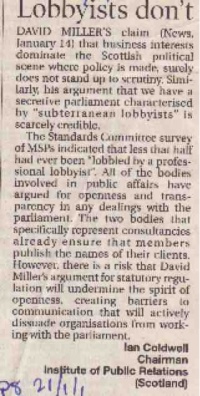
Scotland: Ian Coldwell of the Institute of Public Relations hits back at claims that business interests dominate Scottish politics and objects to the charge that lobbyists operate in a 'subterranean' manner in the Letters page of the Sunday Herald:
- David Miller's claim that business interests dominate the Scottish political scene where policy is made, surely does not stand up to scrutiny. similarly, his argument that we have a secretive parliament characterised by "subterranean lobbyists" is scarcely credible.[6]
Coldwell went on to raise the traditional lobbyist defence that openness and transparency will undermine openness and transparency:
- David Miller's argument for statutory regulation will undermine the spirit of openness, creating barriers to communication that will actively dissuade organisations from working with the parliament.[6]
January 28th
Scotland: David Miller, William Dinan and Philip Schlesinger of the Stirling Media Research Institute issue a response to Ian Coldwell, Chairman of the Institute for Public Relations (IPR) in Scotland. In the letter, published in the Sunday Herald they state:
- "Ian Coldwell, Chairman of the Institute for Public Relations (IPR) in Scotland takes us to task for claiming that lobbyists are subterranean creatures (Reader's Views, January 21). He claims that all the lobbying trade associations have argued for openness and transparency in their dealings with the parliament. This is misleading. In fact every single lobbying and Public Relations trade body (including the IPR) argued against disclosure in their responses to the Standards Committee consultation on lobbying."[7]
February 2nd
Scotland: PR Week 'reports on moves to ensure the Scottish Parliament is wiping the lobbying slate clean'. It reported:
- Back-handers, bribes, favours of a dubious nature - it's not what you know, but who; the world of Scottish public affairs, lobbying, call it what you will, is a shady one, wreathed in a Celtic mist that obscures the view of openness and truth.
- A bit of an exaggeration maybe, but with the shenanigans surrounding the Scottish Executive's investigation into the world of lobbyists you might just believe it.
- Stirling University has just released details of a report that seems to confirm this misleading perception. On 14 January The Sunday Herald published an article, paranoia-inducingly headlined 'Mound more secretive than Westminster', that arguably exacerbates the report's findings.[8]
February 23rd
Scotland: Simon Nayyar, chairman of the Public Relations Consultants Association's Public Affairs Committee, writes to the Stirling Media Research Institute (SMRI) highlighting concerns over written evidence submitted to the Scottish Parliament Standards Committee by the SMRI. In the letter Mr. Nayyar states:
- There are a number of points in your written evidence with which we have concerns, and given that the SRMI (sic) has been called to give oral evidence to the committee on 28 February 2001, we thought you might find it helpful to have the opportunity to discuss these points with us ahead of this evidence session.[9]
The full letter can be viewed here.
February 25th
Scotland: Article of Interest: Kenny Farquharson 'MSPs warned over lobbyists' Sunday Times Scotland, February 25 2001. No longer available online.
February 27th
Scotland: Broadcast: William Dinan, Scottish Parliament inquiry into the regulation of lobbying, BBC Newsnight Scotland, 27 February 2001.
February 28th


UK: The Prime Minister Tony Blair announces that Sir Nigel Wicks is to be appointed as the new Chairman of the Committee on Standards in Public Life.[1]
Scotland: William Dinan and Philip Schlesinger of the Stirling Media Research Institute give evidence at the Standards Committee inquiry on lobbying.[10] SMRI also submits a written paper to the committee which examines the way in which lobbying regulation is accomplished in the US and Canada.
March

Scotland: In March 2001 Polygon published Open Scotland? Journalists, Spin Doctors and Lobbyists, the findings of an ESRC funded study on political communication and devolution.[11] The book was claimed to be:
- The first comprehensive coverage of political communications in Scotland
- Reveals the inside story of broadcasting, journalism, lobbying and spin doctors in Scotland
- Draws on interviews with key players and private documentation never previously made public[12]
According to the blurb:
- Scottish devolution brought high hopes for an open political culture. But how far have these been fulfilled? Open Scotland? argues that in the field of political communication the old, established ways of the British state still remain firmly in place. Westminster and Whitehall cast long shadows over Edinburgh.
- This book offers the first full-scale coverage of how media, politicians and lobbyists interact in the new Scotland. Based on their exceptional first-hand access to the key players, Philip Schlesinger, David Miller and William Dinan have written an inside account of the struggles to establish the rules of the game for covering politics. They have talked to the journalists of Scotland's political media pack who are at the heart of the new political system and who have made a decisive impact on the image of the Scottish Parliament and government. They have observed and interviewed the professional lobbyists and reveal their strategies for achieving a respectable image in Scottish public life. And they have analysed some of the key rows and the failures of news management inside Scotland's government.[12]
Scotland: Stirling Media Research Institute submits supplementary evidence to the Standards committee reporting on a survey of US and Canadian officials involved in the regulation of lobbying.[13] The survey was emailed to some 68 officials, 30 of whom responded. the respondents were 'mainly from the state and federal levels in th US and Canada' all of whom had 'experience of lobbying regulation'.[13] According to the SMRI:
- The most striking finding from our survey is that none of our 30 respondents believed that registration presented a barrier to participation in the democratic process. Many suggested that registration could promote wider participation in the democratic process.[13]
The researchers concluded that:
- The evidence from our survey suggests that lobbying regulation does work in principle and in practice. Of course it is possible that any system may need to be looked at again in the future to take account of experience or developing circumstances, but this is not a reason to postpone making a start now.[13]
A full transcript of the evidence is available here.
March 1st
Scotland: The Scotsman reports on Professor Philip Schlesinger and William Dinan giving evidence before the Scottish Parliament's Standards Committee:
- Professor Philip Schlesinger and William Dinan, giving evidence before the Scottish parliament's standards committee, said all groups who sought to influence the decision-making process should be regulated and money spent on lobbying campaigns disclosed.
- Prof Schlesinger rejected claims from the SNP's Tricia Marwick that a voluntary code of conduct for lobbyists would be preferable to a set of strict regulations laid down by parliament. He said an open register of the activities of lobbying firms would stop the public being suspicious of the way the political system works.
- He said: "We are dismayed by the lack of trust in the political system. Almost every week there are implications about how ministers conduct themselves and unless the public is broadly convinced that there are a set of clear-cut rules, that lack of trust is only going to increase." Prof Schlesinger also dismissed fears that forcing lobby firms to be regulated would create an elite of registered lobbyists and prevent smaller groups from taking their cases to parliament.[14]
March 9th
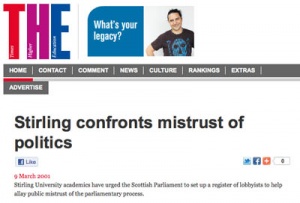
Scotland: The Stirling Media Research Institute urge the Scottish Parliament to set up a register of lobbyists. The Times Higher Education Supplement reports:
- Stirling academics have been researching public relations and the lobbying industry since 1996, partly funded by the Economic and Social Research Council. Researcher William Dinan said there were serious problems with lobbyists' self-regulation and voluntary codes of conduct at Westminster.
- "Derek Draper, who was at the centre of the recent cash-for-access scandal at Westminster, admitted in his evidence to the Neill committee that he did not have a clue about how self-regulation worked," he said.
- "In the United Kingdom there are no examples of self-regulation exposing corrupt practice or addressing questions of the probity of lobbyists. That has always been done by investigative journalism and the media. It is not in the interests of the industry to expose bad practice, as that makes it all look bad." [15]
Scotland: Philip Schlesinger, director of Stirling University's media research institute gives evidence to the Scottish Parliament's standards committee. Schlesinger states:
- We intend to stick to our guns and say what we think, despite the attempt by one lobbying trade organisation to lobby us in advance of this hearing, perhaps a classic example of lobbying gone wrong.[16]
March 18th
Scotland: The Sunday Herald reports on issues raised in the book Open Scotland? and in particular with regards to journalists who work for broadcast news organisations whilst also training Scottish civil servants in how to handle the media. The Sunday Herald reports:
- Open Scotland? author Miller says that he had no evidence that financial links with the Scottish Executive had influenced any journalist's work, but he was concerned that there could appear to be a conflict of interest.
- "My view is that journalists really should not get involved with government publicity. It blurs the line between journalists as independent of the state and journalists as mouthpieces of the state. They are employees of the Executive while they do that work."
- The book states: "In a country as small as Scotland, with such close personal and cultural links between the media and the political elite, it might be argued that adding further economic links raises the potential for a serious conflict of interest."[17]
March 25th
Scotland: Douglas Fraser, political editor for The Sunday Herald, reports on the findings from the Stirling Media Research Institute's study into the effects of devolution on Scottish politics, governance and transparency. Fraser reports:
- A PARLIAMENT was intended to open Scotland up. The vast machinery of government that had ticked over without much democratic scrutiny would be put on public view, and those wielding power would be held accountable. That was the ideal. The reality has been very different, according to the most thorough research project into the effects devolution had in its first year on making Scottish politics and government more transparent.
- The project at Stirling University's media research institute publishes its findings in full next week, with the main points revealed exclusively today in the Sunday Herald. The key outcome is that for all the emphasis and expenditure on presentation and for all the extra press officers, Scotland remains far from open. That is because politicians indulged in damaging "spin wars" with each other; because the civil service failed to reform itself; because lobbyists continued to operate, unregulated, in the shadows; and because journalists (including this writer, presumably) colluded to make sure they were the ones who had control over access to politicians. They find the Scottish home rule project suffered from basing itself too closely on the Westminster and Whitehall model it was seeking to avoid.[18]
March 27th
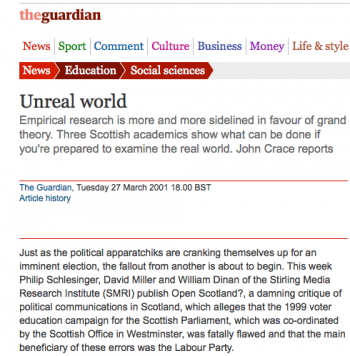
Scotland:The Guardian reports the publication of Open Scotland? noting that 'Empirical research is more and more sidelined in favour of grand theory' in the Universities and stating that 'Three Scottish academics show what can be done if you're prepared to examine the real world'. Open Scotland? is described as 'a damning critique of political communications in Scotland'.[19]
- Empirical research into political trends has become unfashionable these days, Miller contends. "Many of the radicals of the 60s and 70s have drifted off into the arcane language game known as postmodernism or to other exotic theories from the left bank, in which nothing but language was real," says Miller. "As a result, not only did they not do empirical research on the real world, but some of them didn't even believe that there was a real world to research. With the abandonment of concepts of truth and reality, it became rather hard for researchers to point out the latest piece of government misinformation, secrecy or manipulation."...
- Miller goes on to say that to many of the new breed of academics, whose desire to climb the greasy pole is matched only by their reluctance to rock the boat, the notion of independent research is anathema. It doesn't pay well, it's time-consuming and it's potentially controversial. None of which is exactly career-enhancing within the academic establishment. "You do get whispering campaigns," says Miller. "You hear that such and such a person is a trouble maker, and before long the gossip has become fact. No wonder so many academics are frightened of looking into areas where they're not wanted. Jobs are hard to come by, and the structures by which academic performance is measured are designed to favour consensus. The Research Assessment Exercise gives far greater reward to academics whose articles appear in international peer-reviewed journals, which research has shown are read by an average of between 1.5 to 6 people, than to those who are prepared to engage in a more public debate."[19]
According to The Guardian: 'three people who are almost certain to find themselves crossed off Tony and Cherie's guest list - assuming they were ever on it - are Schlesinger, Miller and Dinan.'[19] The report also stated: 'Not one to mince words, Miller argues that academics too often leave it to journalists to dig out political scandals; and that many of their peers have been neglecting their duties to the public in this area. "Academic salaries are paid for out of public funding," Miller points out.'[19] The report also notes that the research on lobbying in Scotland was being used in a knowledge exchange process:
- The research team is now at the forefront of the campaign for the lobbying system in the new parliament to be regulated... And while it may not always produce the results that the government has in mind, it still attracts kudos and respect for its independence. "We are consulted by government and other official bodies, who regard us as a source of relevant advice," says Schlesinger. "The key issue for me is that we're attempting to do some public policy research and present public interest arguments about devolution which seem not to be coming from anywhere else just now. This is a key role for academia. In my view it sets us apart from thinktanks, and because we have no-strings funding we can offer an honest view based on as exhaustive a research process as the constraints allow."[19]
April 8th
Scotland: In a Scottish Parliament special Arnold Kemp, writing for The Observer discusses spin, the Scottish Parliament and the recently published academic book, Open Scotland?. Discussing Open Scotland? Kemp states:
- The authors take us over old battlegrounds - the vain struggle to secure a 6pm news ordered according to Scottish priorities, the internecine warfare among the early spin-doctors and the shock to the new body politic by this newspaper's disclosures of Lobbygate.
- Many of the Executive's early troubles were stirred up by a generally hostile press keen for mischief and, as this study shows, not always punctilious with the facts. The book examines, in particular, how a story in the Scotsman was doctored to make it more sensational and, as is customary in such situation, concludes by blaming the hapless and anonymous sub-editor.[20]
April 23rd
Scotland: In the build-up to the 2001 general election, Peter Preston, writing for The Guardian, discusses how devolution may make the election very unpredictable :
- In a way, these past two years, Scotland has ceased to exist south of the border. It is up there somewhere, pursuing its own concerns. And in just the same way, from Berwick on, England has faded into the mists of public consciousness. What you see and read is what you get.
- Take a brilliant new study of creeping change called Open Scotland? by three academics at the Stirling Media Institute. They quote the political correspondent of the Scottish Sun: "I can't think of the last time that I spoke to an MP - they're just irrelevant," he says. They quote the political editor of BBC Scotland: "We have all these Scottish MPs and we never write, we never phone, we never make contact with them. They don't have anything to say." And here's the Scotland correspondent of Channel 4 News: "I just don't have the names of the UK cabinet at my fingertips the way I used to. I don't think anybody thought we would feel quite so disconnected so quickly."[21]
June 1st
Scotland: The Standards Committee of the Scottish Parliament issues a Consultation Paper: Statutory Registration of Commercial Lobbyists[22] This notes the decision to favour a statutory system of regulation and asks for responses by 17 August 2001:
- At its meeting on 25 April 2001 the Standards Committee agreed to develop proposals to establish a statutory registration scheme for commercial lobbyists. The Committee’s decision to recommend such a scheme represents a key stage in its inquiry into lobbying in the Scottish Parliament. The Committee has taken evidence from the ‘lobbied’ as well as lobbyists and academic commentators.
- The Committee recognises that lobbying is an integral element of the democratic process. Its proposals to establish a statutory registration scheme are not designed to outlaw the activities of lobbyists in relation to the Parliament. Nor will the proposals confer any elite status on particular lobbyists or in any way restrict access to the Parliament by other groups or individuals. The Committee’s decision to recommend the introduction of a registration scheme for commercial lobbyists stem from its view that there is a distinction between organisations which lobby on their own behalf and those which lobby on behalf of third parties in return for payment. The Committee views commercial lobbying as a legitimate component of political engagement. The proposals are, however, intended to increase the transparency of such activity, in line with the Parliament’s core principles of accessibility and openness.
- The Committee recognises that this is a complex policy area and is keen to involve those lobbyists who will be affected by the registration scheme in developing proposals which are both workable and effective. The Committee has therefore produced this paper which sets out a draft framework for its proposals and invites comments on it.
- In working out the policy detail of the registration scheme the Committee aims to consult primarily with umbrella organisations representing the commercial lobbyists and other organisations that may be affected. However, the Committee also welcomes written submissions from other interested parties.[22]
June 11th
Scotland: Ian Hargreaves reviews Open Scotland? in the New Statesman:
- Yet what the authors of this excellent book, from Stirling University's media research institute, conclude is that, in building a new set of political institutions and cultures, Scotland meekly followed where Blair and Whitehall led. The spin-doctors, special advisers, lobbyists and PR people multiplied; the civil service stuck its feet in the mud and parliament lacked the will to get tough -- for example, by requiring a register of lobbying activity. The authors' forlorn final word is to note that "whether the imagination, courage and resources to depart from Westminster orthodoxy exist at Holyrood remains to be seen". It is not a conclusion superficially reached.
Hargreaves continues:
- Where the book doesn't quite convince is on the deeper explanation for such failures. These are, paradoxically, laid at the door of both the "marketisation" of politics -- its domination by business -- and the smugness of public officialdom. The authors' conventional conclusion is that the answer to both problems lies in the reassertion of the power of the elected representative. But what they do not sufficiently consider is that their book reveals a polity so infested with communication that an institution based around debates and votes needs to ask more searching questions about itself than those posed here.[23]
July 16
Scotland: In a written response to an invitation by the Standards Committee to comment on the statutory registration of commercial lobbyists Professor Justin Greenwood stated:
- The requirements of paragraph 21 will certainly keep a number of administrators employed at public expense, but will the public interest be served by this purpose? 'Public Choice' theory suggests that administrators seek to expand their activities in search of careers, status, control and jobs, and in doing so may contravene the interests of the taxpayer and citizen, and restrict the autonomy of other professionals. In short, the public choice tradition suggests there is a tendency for administrators to find things to do which impose burdens on others and which are not always in the wider public interest, or the stakeholders of the domains in which they operate.
- In sum, the proposals seem unduly directed at one type of lobbyist for reasons that are unstated, and as such raise their own injustices. They appear to serve no public interest goal and may even damage it.[24]
August 16
Scotland: The Institute of Chartered Accountants of Scotland raises fears over the Scottish Parliament proposals to introduce a statutory registration scheme for commercial lobby groups. From Accountancy Age:
- ICAS has poured fierce criticism on the proposed scheme as 'onerous' and 'disproportionately burdensome' and fears it could force firms to abandon offering extra advice because of the risk of it being viewed as lobbying. In the first move of its kind for the UK, the Scottish parliament is considering imposing a statutory registration scheme for commercial lobby groups, which it says will ensure complete transparency.
- The proposals extend the definition of lobbyist and requires lobbyists to declare details of expenditure and fees received for lobby projects, identity of clients and communications techniques used.
- Bodies defined as lobbyists could be fined if they are found in breach of the rules.
- But a submission by ICAS in response to the consultation, due to end this Friday, states: 'We believe that the focus of any disclosure requirements should be on the members of the Scottish parliament and not on a potentially wide range of private sector entities.'[25]
August 17
Scotland: The Stirling Media Research Institute submits its third response to the Standards Committee inquiry on lobbying the Scottish Parliament. It answers the specific questions raised by the Committee, but starts by saying 'first we think it worthwhile to outline the general case for registration' of lobbyists.[26]
According to the submission the case was as follows:
- The rationale for the registration of lobbying is that there is a clear public interest in openness and disclosure. This is entirely consistent with the CSG’s principles and it would be a clear indication that the Scottish Parliament rejects of the status quo of secrecy and convenience in favour of openness and accountability.
- It is noteworthy that most of those engaged in lobbying the Parliament and the Executive are opposed to any form of regulation or registration. They insist that statutory registration schemes are overly bureaucratic and incapable of tackling the problems they seek to address. Such arguments ignore the fact that self-regulation in the United Kingdom has patently failed either to expose impropriety (this has only been achieved through investigative journalism) or to make the business of lobbying open and transparent, to both politicians and the public.
- Opponents of registration use arguments that suit their own vested interest in avoiding disclosure. The point of registration is not to impose barriers to participation, but to allay public fears and cynicism about the interconnections between money, vested interests more generally (including the non-commercial ones) and the political world. Such cynicism is highly damaging to a participatory democracy. The requirement for paid lobbyists to fill in a short declaration of interests periodically is a small price to pay in building public confidence.[26]
The submission went on to note some of the tactics of lobbyists in opposing registration:
- We have been struck recently by the disparities between the public and private debate on this issue. During our research we have been told by some lobbyists that they have changed their minds regarding the merits of registration. However they do not wish to say so in public lest they contradict earlier statements on the record.It is also privately acknowledged by some that there may be a role for independent scrutiny of the finances involved in the Scottish lobbying business. Most bizarrely one lobbyist told us that it is acceptable to offer a bribe to an MSP and that responsibility for accepting or rejecting such offers lies squarely with elected politicians. Given such views there is a pressing need for the registration of lobbyists to complement the regulations to which elected representatives are bound.
- We continue to believe that it is extremely important for the Executive to be governed by a similar regulated approach to lobbying. We accept that the committee has no formal power to regulate the Executive, but it does have the power to regulate the conduct of ministers, since they are also MSPs. The committee will need to consider carefully how best to include ministers and their staff in any regulatory scheme. The committee could also, if it so chose,recommend the registration of lobbying by the Executive itself. This stance would have a strong moral force. Indeed, regulating lobbyists is likely to be seen as good practice which the Executive might want to follow.[26]
Scotland: A PR Week editorial argues against the proposed introduction of a lobbying register, calling it a "knee-jerk reaction to the Beattie Media scandal".[27]
Scotland: In another PR Week article the Public Relations Consultants Association claim that the proposed statutory code of conduct for lobbyists "could contravene three articles of the 1998 Human Rights Act, relating to privacy, discrimination and freedom of expression".[28]
August 19th
Scotland: The Sunday Herald reports that lobbyists falling foul of proposed new rules on transparency could be fined or even sent to prison.[29]
August 20
Scotland: The Scottish Council for Development and Industry (SCDI) argue against the introduction of a statutory register of lobbyists proposing instead that all diaries of ministers and MSPs should be open to public scrutiny:
- The SCDI believes the focus should be on MSPs' conduct and responsibilities, rather than the organisations in contact with them. It adds: "Put simply, it would be easier to regulate, and expose to public scrutiny, the diaries and workings of 129 MSPs than to attempt to regulate the activities of the many hundreds of commercial and non-commercial lobbyists."[30]
August 22nd
Scotland: Dr. David Miller, William Dinan and Prof. Philip Schlesinger of the Stirling Media Research Institute counter claims made by Scottish Council for Development and Industry that a register for lobbyists is unworkable:
- The Scottish Council for Development and Industry claims that plans to set up a register for lobbyists are unworkable. On the contrary, lobbying regulation exists and works smoothly in a wide variety of other political systems. In the US, for example, there is regulation at the federal, state and even the county level. Regulation of lobbying is the only way to ensure a measure of transparency in Scottish political culture.[31]
In another response Dr. David Miller, William Dinan and Professor Philip Schlesinger argue why it is important to scrutinise both MSPs and lobbyists:
- We disagree that scrutinising only MSPs and not lobbyists would be preferable for democracy. MSPs are subject to regulation of their conduct and rightly so. Similar standards should obtain for those attempting to influence MSPs and ministers. A valuable first step is to require that vested interests such as lobbyists declare their clients and disclose how much they are paid to influence MSPs. The Scottish Council for Development and Industry apparently sides with the vested interest on this matter. But we were somewhat perplexed at your editorial statement (August 20) that the SCDI has no particular axe to grind. The SCDI executive committee and board are predominantly made up of some of the largest corporations in Scotland. Readers might like to peruse their website (www.scdi.org.uk) and check out the numbers of lobbying interests.[32]
August 24
Scotland: Robert M Armstrong of the Freight Transport Association argues that there is a big difference between the activities of political lobbyists and activities carried out by trade associations:
- IT is one thing to argue about the rights and wrongs of monitoring the activities of political lobbyists. These are firms that take individual fees from individual companies in return for lobbying advice and establishing political contacts.
- This is a million miles away from the activities of legitimate trade associations who have their own well-established democratic processes and articulate views on behalf of a given sector of industry.
- Your correspondents from the Stirling Media Research Institute don't seem to have grasped this fundamental difference. Contrary to their views, the activities of a trade association lobbying on behalf of its members effectively are the very antithesis of "secretive and opaque".[33]
Jack Irvine, executive chairman of Media House International Ltd also takes issue with the points raised in the Stirling Media Research Institute's article, Why lobbyists need to be scrutinised:
- This clamour by a minuscule section of the chattering classes for regulation of lobbyists comes about following the pathetic performance of a few daft laddies during the "Beattiegate" affair.
- Both the Stirling group and the chairman of the Standards Committee, Mike Rumbles, seem unable to grasp the glaring inconsistency in their proposals. A company with in-house lobbyists will not have to disclose their expenditure and modus operandi but a freelance consultant will.[34]
August 26th
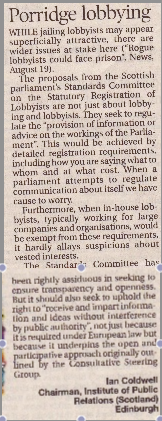
UK / Scotland: Ian Coldwell of the Institute of Public Relations writes in response to the Herald story of the previous week raising the possibility that lobbyists breaching transparency rules could be jailed. He argues that transparency rules would undermine transparency and could be illegal. the Standards committee he states should:
- seek to uphold the right 'to receive and impart information and ideas without interference by public authority', not just because it is required under European law but because it underpins the open and participative approach originally outlined by the Consultative Steering Group.[35]
August 27th
Scotland: Ian Coldwell, chairman of the Institute of Public Relations Scotland argues in The Scotsman:
- The arguments of the Stirling Media Research Institute on the regulation of lobbyists misses one of the central features of the standards committee proposals.
- The proposals go far beyond regulating lobbying as commonly understood. They also aim to regulate the "provision of information or advice about the workings of the parliament". This would be achieved through a complex registration scheme.
- It is at best questionable whether any public body should be allowed to regulate communication about itself. It is all the more worrying that "in-house lobbyists", typically working for large companies and organisations, would be exempt from these requirements.
- Article 10 of the European Convention of Human Rights protects the right to "receive and impart ideas and information without interference of public authority". The committee’s commendable efforts to ensure transparency and openness can surely achieve success without interfering with these rights. [36]
August 29th
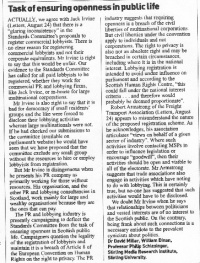
Scotland: Dr David Miller, William Dinan and Professor Philip Schlesinger of the Stirling Media Research Institute write a letter in response to Jack Irvine's letter, Glaring inequality in proposals for lobbyists:
- Actually, we agree with Jack Irvine (Letters, August 24) that there is a "glaring inconsistency" in the Standards Committee's proposals to register commercial lobbyists. There is no clear reason for registering commercial lobbyists and not their corporate equivalents. Mr Irvine is right to say that this would be unfair.
- Our evidence to the Standards Committee has called for all paid lobbyists to be registered, whether they work for commercial PR and lobbying firms, like Jack Irvine, or in-house for large multinational corporations.[37]
August 30th
Scotland: Dr. David Miller, William Dinan and Prof. Philip Schlesinger of the Stirling Media Research Institute write in response to Ian Coldwell (Letters, 27 August, The Scotsman):
- Ian Coldwell (Letters, 27 August) does scant justice to the Standards Committee to regulate lobbyists. These do not interfere in any way with the "provision of information or advice about the workings" of parliament. Just the opposite is true. These proposals would require disclosure of activities involving "information or advice" about parliament, only where payment is involved.
- Lobbyists work to advise clients on how best to approach MSPs and civil servants. The proposal to regulate them does not interfere with such communication. The over-reaction by the PR industry against lobbying registration underlines the need to seek transparency in Scottish political life.[38]
September 1st
Scotland: The Scotsman publishes a letter by Iain D Duff, chief economist and policy manager for the Scottish Council for Development and Industry (SCDI), in response to a letter published by the Stirling Media Research Institute ('Essential to regulate lobbyists', The Scotsman, 22 August 2001):
- I am uncertain as to the evidence on which Dr David Miller, William Dinan and Professor Philip Schlesinger (Letters, 22 August) based their comments on the submission by the Scottish Council for Development and Industry to the standards committee on the regulation of lobbyists.
- Far from the submission being "a rearguard action by vested interests", it is, in fact, a restatement of existing SCDI policy, with added detail. It was first formulated as part of our submission to the consultative steering group in June 1998, which I authored, and is available on the SCDI website.
- It was discussed and ratified by our executive committee, which comprises a cross-section of the broad membership of SCDI.
- The current submission was presented to our board prior to it being sent to the standards committee. SCDI regarded regulation of lobbyists as a bad idea in 1998 and continues to regard it as a bad idea.[39]
September 2nd

Scotland: The Sunday Herald publishes a letter from the SMRI rebutting the arguments of the Institute of Public Relations:
- Contrary to Mr. Ian Coldwell of the Institute of Public Relations, registering lobbyists does not interfere with the right to receive and impart information enshrined in the European Convention on Human Rights (Letters, 26 August).
- It simply requires vested interests to disclose how much money they are paying to influence the decisions of MSPs, and for what purpose. This will not in any way stop vested interests from communicating, but it will afford a sceptical public some knowledge about an otherwise opaque world whose activities affect us all. In fact, we actually agree with the IPR that it would be unfair just to regulate commercial lobbying consultants and to leave completely unregistered those working in-house for large corporations. We have repeatedly said so in our evidence to the Committee.
- The lobbying and PR industries (the IPR included) are currently engaged in a concerted campaign to deflect the Standards Committee from taking an important step in the direction of openness and accountability in line with the high aspirations once held for the Scottish Parliament. It is important for the public interest that the committee stick to its guns.[40]
September 6th
Scotland: The Stirling Media Research Institute (SMRI) issue a response to Iain Duff of the Scottish Council for Development and Industry:
- Iain Duff of the Scottish Council for Development and Industry, (Letters, 1 September), denies there is a rearguard action by vested interests to prevent the Scottish parliament’s standards committee from registering lobbyists. But the evidence is clear.
- The campaign has resulted in a number of articles popping up in the press. All of these interventions sing from the same hymn sheet, raising objections to lobbying registration, which curiously coincide with the interests of those making them.[41]
2002
May 12th
Scotland: Scotland on Sunday report that religious groups are among the most influential growing number of lobbyists in Scotland:
- A network of highly-organised evangelical Christians who spread briefing papers to fellow travellers via the internet and meet discretely with government ministers is rivalling the power of many of Scotland’s elected representatives.
- Devolution has brought Scotland’s churches closer to the centre of power than ever, allowing figures such as the late Cardinal Winning to be credited with diluting Executive plans to repeal Section 28 - but Labour insiders say much was down to the lesser known group Christian Action Research and Education (Care).
- Emulating the Christian right in the US, Care has spent large sums on lobbyists to circumvent the electoral process and put morality firmly on the agenda in all the UK’s parliaments and assemblies: in Edinburgh, London, Cardiff and Belfast.
Sociologist David Miller recently stated 'We need to regulate the whole lot - groups like Care and in-house corporate staff. The system is open to abuse. Groups who can afford it can gain undue influence in the parliamentary process. It's basically the buying of the parliament.[42]
In another report Scotland on Sunday reported:
- A Scotland on Sunday investigation has established that Christian Action Research and Education (Care), a UK charity with an annual income of 2.4m, has drawn up plans for as many of its members as possible to join mainstream political parties.
- "Last night it led MSPs to accuse the group of trying to "pervert democracy". Care was among the most vigorous opponents of the repeal of Section 28, which banned the promotion of homosexuality in schools.
- The organisation aims to tackle what it regards as Scotland’s "permissive society", including government plans to give greater rights to homosexuals and quicky divorces.[43]
June 24th
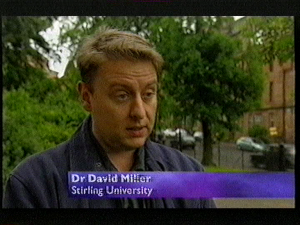
,
USA / Scotland: The Telegraph reported the issue some days later:
- A row has broken out after a Labour backbencher signed a confidentiality agreement with an American drugs firm ahead of a fact-finding trip to the US.
- Margaret Jamieson, MSP for Kilmarnock and Loudoun, agreed to sign the 10-year agreement at the request of pharmaceutical company Pfizer. Shw is making the trip as part of the Scottish Parliament's business exchange programme, which was set up to give MSPs a better understanding of the business community.
- Scottish Socialist MSP Tommy Sheridan has criticised Ms Jamieson, who is deputy convener of the Parliament's health committee, for agreeing to sign the agreement - and for going on the trip to America.
- He said: "It is totally unacceptable for an MSP to sign a 10-year confidentiality clause with a private company. We are here to serve the people of Scotland, not the multinationals.[44]
Scotland: Newsnight Scotland interview David Miller with regards to lobbying at the Scottish parliament.
October 7th
Scotland: Newsnight Scotland reveals that the Scottish Parliament Business Exchange, a scheme which stated that it was 'non-lobbying' had in fact been used by lobbyists. Elaine Thomson MSP was revealed not to have known that the 'lawyer' shadowing her had no legal qualifications, and was in fact a lobbyist working for Saltire Public Affairs, the lobbying subsidiary of law firm Shepherd & Wedderburn.
Here is what she said to Newsnight Scotland:
- Elaine Thomson MSP: One of the things that was done when the inward Parliament programme was organised was that all the names, positions and companies of those involved were all published and was quite open.
- Gordon Brewer (Newsnight): So you were aware that this woman was not a lawyer, but in fact worked for a division of Shepherd and Wedderburn, which from what it says about itself looks very much like a lobbying company?
- ET: It's a company that deals in information and it is the public affairs arm of that company. I mean the individual in question is professionally, as I understand it, a solicitor, though she is currently employed in the public...
- GB: She isn't actually.
- ET: Isn't she?
- GB: We asked the company today and they said she has no legal training.
- ET: Right... I thought she was professionally qualified but obviously I should have read her CV a little more effectively.[45]
October 8th
Scotland: David Miller is interviewed on Good Morning Scotland about the Scottish Parliament Business Exchange.[46]
October 10th
Scotland: Broadcast: David Miller, Interview on the regulation of lobbying at the Scottish Parliament, Scottish Television - The week in politics, 10 October 2002.
October 21
Scotland: In 'Open Scotlands Executive' William Dinan discusses the issues surrounding devolution and the problems faced by the Scottish media in covering and holding to account the new political institutions. [47]
October 27
Scotland: Article of Interest: Dinan, W and Miller, D (2002) 'Called to Account', Sunday Times Scotland, Ecosse Section, 27 October: 2.
November 14th
UK: Broadcast: David Miller, Interview on corporate communication, universities and the public interest, BBC Radio 4 - You and Yours, 14 November 2002.
November 21st
UK: The Eighth Report, ‘Standards of Conduct in the House of Commons’, is published by the Committee on Standards in Public Life.[1]
2003
January 1st
World: In 'Unspinning the globe' David Miller studies the activities of PR companies and the methods they employ to shape and maintain an economic environment that is beneficial to their commercial interests.[48]
Article of Interest: David Miller, 'Corporate power, institutional corruption', Scottish Left Review, 1 January 2003, p. 6-7.
April 8th
UK: The Ninth Report, ‘Defining the Boundaries within the Executive; Ministers, Special Advisers and the permanent Civil Service’, is published by the Committee on Standards in Public Life.[1]
April 22nd
UK: Sir Alistair Graham takes over as chair of the Committee on Standards in Public Life.[1]
May 27th
UK: Broadcast: David Miller, Interview on media, public opinion and influencing Parliament, Education for schools - BBC, 27 May 2003.
September 8th
UK: The Committee on Standards in Public Life publishes its First Survey Report of public attitudes towards conduct in public life.[1]
September
Scotland: Article of Interest: David Miller, 'Corporate power, institutional corruption' Scottish Left Review, Issue 18, Sept/Oct 2003, p6-7. http://www.scottishleftreview.org/Currentissue/I18DM.htm
November 6th
UK/US: David Miller publishes a paper entitled 'System failure : it's not just the media, it's the whole bloody system' discussing the reasons behind voter apathy and declining electoral turn out in the UK and US. Although Miller states that the media share some of the blame for voter apathy, the main underlying factor however is the failure of the democratic system itself.[49]
2004
May
UK: SpinWatch is established ‘by leading journalists and media academics’[50] The group, run by Professor David Miller, Dr. William Dinan, journalist Andy Rowell and Researcher Eveline Lubbers, ‘subjects the PR industry to radical critique from a radical, peace perspective’.[51]
September
Scotland: Article of Interest: David Miller ‘Profit and Parliament’ Scottish Left Review, Issue 24, Sept/Oct 2004: 14-15. http://www.scottishleftreview.org/
Scotland: Devolution in Scotland was meant to bring democracy closer to the people but in 'Taking The Risk Out Of Devolution Scoop' David Miller details how commercial interests have managed to influence the democratic process.[52]
November 18-19th
UK / Scotland: SpinWatch and the Public Interest Research Network with the support of the Scottish Left Review held 'a two day research seminar on the topic of spin and corporate power'. According to the CPBF announcement:
- Speakers from Australia, the US, the Netherlands, Germany, Belgium, England and Scotland are taking part. Organisations taking part include Platform, Corporate Europe Observatory, PR Watch, Corporate Watch and leading academic researchers.
Speakers included Bob Burton (PR Watch, Disinfopedia), Aeron Davis (City), William Dinan (CRAG, Spinwatch), Chris Grimshaw (Corporate Watch), Olivier Hoedemann (Corporate Europe Observatory), Eveline Lubbers (Spinwatch), James Marriot (Platform) David Miller (Strathclyde, Spinwatch), Laura Miller (PR Watch, US), Greg Muttit (Platform), Judith Richter (International Baby Food Action Network), Andy Rowell (Journalist, Spinwatch), Leslie Sklair (LSE), Granville Williams (Huddersfield, CPBF)[53]
A report on the conference noted the response of one former New Labour spin doctor:
- Interviewed on Newsnight Scotland, Peter McMahon a former new labour spin doctor dismissed the SpinWatch site and labelled David Miller... a ‘sub-Marxist conspiracy theorist’.[54]
UK: The SpinWatch website (http://www.spinwatch.org) is launched. Receiving a mention in the diary of industry magazine PR Week, the launch was announced as follows:
- Readers beware - self-appointed watchdog and exposer of underhand and deceitful PR practices SpinWatch is getting its communications systems in order. The organisation of academics, journalists and researchers this month launches a website that it promises will 'counter corporate PR and government propaganda'.[55]
However, PR Week wonders if SpinWatch itself is practising a little bit of media manipulation to maximise its buzz:
- In what seems like a contradiction, SpinWatch is 'launching' a website that it claims is already receiving 400 hits a day from people in 70 countries and has been live for more than a month. Surely controlling the timing and flow of information is a central allegation levelled at PROs? Perhaps the website's 'launch' is being used as a means to promote its latest conference, major reports and SpinWatch expose, details of which fill the vast majority of the launch press release.[55]
2005
January 19th
UK: The Tenth Report, ‘Getting the Balance Right – Implementing Standards of Conduct in Public Life’, is published by the Committee on Standards in Public Life.[1]
March
EU: European Commission Vice President Siim Kallas launches the European Transparency Initiative (ETI). During his speech at the launch of the ETI in Nottingham, Kallas himself remarks that ‘Lobbyists can have considerable influence on legislation, in particular on proposals of a technical nature... But their transparency is too deficient in comparison to the impact of their activities’.[56]
March 14th
Article of Interest: David Miller, 'The age of the fake', Spinwatch, 14 March 2005.
April 7th-8th
Scotland / EU: David Miller and William Dinan co-convened with Corporate Europe Observatory an international networking meeting on the European Transparency Initiative at in Brussels titled 'Curbing corporate power over EU policy-making'. Dinan and Miller gave a paper titled: ‘Lessons from the campaign to register lobbyists in Scotland’ at the seminar at Scotland House, Rond-Point Schuman in Brussels.
April 27th
EU: David Miller and William Dinan wrote to Siim Kallas, vice-president of the EU Commission on the 27 April regarding the European Transparency Initiative.[57] The full letter can be viewed here.
May
EU: The ETI is formally debated by EU Commissioners.

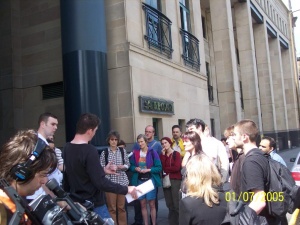
Friday 1 July
Scotland: SpinWatch organises a ‘SpinWalk’ in Edinburgh to ‘shine a light on the activities’ of corporate Scotland. Inviting anti-spin activists to ‘know your enemy more effectively’, the tour takes in ‘lobbying consultancies and PR outfits working incessantly to boost corporate power’.
SpinWatch stated that the:
- 'SpinWalk' will visit those oil companies, banks and businesses profiteering from privatisation and PPP in Global South countries, as well as the key lobbying consultancies and PR outfits who help boost corporate power and wealth. Starting at the Usher Hall, the walk will end at the Scottish Parliament "around which the corporate lobbyists swarm to ensure that Jack McConnell and his cronies are kept sweet".[59]
The PR Week Diary reported that:
- PR folk in Edinburgh are on edge this week, with industry critic SpinWatch planning a 'SpinWalk' today (1 July) to 'shine a light on the activities' of corporate Scotland.
- SpinWatch, which also hosted a guided tour of agencies in London last autumn, is inviting anti-spin activists to 'know your enemy more effectively' by mustering at Usher Hall in advance of a tour of 'lobbying consultancies and PR outfits working incessantly to boost corporate power'. Gulp.
- Of course, police are already on standby in the city to deal with any civil disturbances that may accompany the somewhat higher-profile marchers set to descend on Edinburgh to raise awareness of global poverty this weekend.
- One PR man in the city tells us: 'A lot of companies have taken on extra security for the G8 thing. These "anti-spin" campaigners will probably be mistaken for outright anarchists - they may well end up in a cell.'
- Suggesting SpinWatch's activists use their time 'more productively', our hero declares, with no hint of a tremble: 'Surely there are far more deserving culprits for their ire than us?' Surely there are, but perhaps best batten down the hatches anyway, just in case.[58]
Sunday 3 July
Scotland: The G8 Alternatives Counter Summit was held in Edinburgh at venues across the city the day after the Make Poverty History march. SpinWatch played a leading role in organising the Counter-Summit.

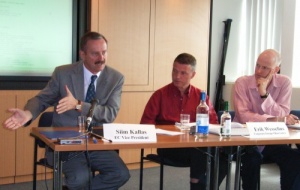
July 19th
EU: The Alliance for Lobbying Transparency and Ethics Regulation in Europe (ALTER-EU) is established. ALTER-EU is a pan-European civil society organisation representing a diverse range of over 160 organisations whose shared interest is in transparency as a first step to a more democratic and accountable EU. The Alliance emerged out of a pre-existing campaign set up to tackle environmental and developmental externalities of EU trade policy.[61] ALTER-EU is coordinated by a Steering Committee which currently has the following members: Paul de Clerck (Friends of the Earth Europe); William Dinan (Strathclyde University & SpinWatch); Marc Gruber (European Federation of Journalists); Yveline Nicolas (Adéquations); Ulrich Müller (LobbyControl); Jorgo Riss (Greenpeace European Unit); and Erik Wesselius (Corporate Europe Observatory).[62] ALTER-EU members groups are themselves expected to practice ‘unilateral transparency’ as they campaign for ‘EU lobbying disclosure legislation’; ‘enforceable ethics rules for lobbyists (for instance prohibiting employment of officials or their relatives for lobbying purposes’; and ‘an improved code of conduct for European Commission officials’. The coalition has led the European debate on the European Transparency Initiative (ETI) and the need for lobbying disclosure and regulation of ethical standards.[62]
November
November 9th
EU: The European Transparency Initiative (ETI) is formally adopted by the European Commission.[63]
November 10th
UK: It emerges that Labour MP David Blunkett was paid £15,000 by APPC members Weber Shandwick to speak at a dinner hosted by the agency. The APPC code states that it is against the rules for their members to ‘make any award or payment to any MP, MEP or sitting peer’. However, while the lobbying arm of Weber Shandwick is a member of the APPC, its corporate practice - which paid for Blunkett to speak - is not, and therefore the rules were not officially breached. This prompted the APPC to review their code and address ‘the grey area’ regarding member agencies which are part of large PR groups. Weber Shandwick CEO Colin Byrne defended the payment, saying ‘There is nothing wrong with MPs being paid for after-dinner speeches if they abide by parliamentary rules’.[64]
2006
March 17/18th
EU: Klaus Kocks, former chief spin doctor of the German nuclear industry, states 'As a spin doctor I'm strongly opposed to discriminating against lying'. Kock made the comments whilst speaking at a seminar organised by the Swiss Journalism School in Lucerne on March 17/18. Kock went on to say it is 'a neurotic obsession of calvinistic witch hunters ' to 'discriminate against' and 'delegitimise' lying. [65]
April 14th
Scotland: The Scottish Green Party claim that the science briefings provided to MSPs and their staff by the Scottish Parliament science information service may be written by industry lobbyists. The service, which is meant to be impartial, is jointly run by the Scottish Parliament, the Royal Society of Chemistry and the Royal Society of Edinburgh along with other scientific bodies.
However, information accessed by the Greens through a freedom of information request showed that those contributing to the advice included Sir Tom McKillop, the then chief executive of AstraZeneca, a major pharmaceutical company.
Professor David Miller of Strathclyde University stated that Willie Rennie a Liberal Democrat MP, effectively ran the science information service whilst working for a PR company hired by the Royal Society of Chemistry.[66]
May 3rd
EU: European Transparency Initiative (ETI) Green Paper published.
The European Transparency Initiative (ETI) Green Paper is published. The paper states:
- With the European Transparency Initiative, the Commission has launched a review of its overall approach to transparency. The aim is to identify and stimulate a debate on areas for improvement. Consequently, the Initiative covers a broad spectrum of issues. These range from fuller information about management and use of Community funds to professional ethics in the European institutions and the framework in which lobby groups and civil society organisations are operating.[67]
May 21-22
Scotland: Scotland: Neoliberal Scotland?: Rethinking Scotland in the global context conference organised by the Department of Geography & Sociology, University of Strathclyde. Glasgow, 21st to 22nd May 2006. The call for papers noted:
- 2006 marks seven years since the creation of the Scottish parliament. With the 'seven year itch' in mind we suggest that the time is ripe for beginning a period of critical reflection. The devolution settlement seemingly not only represented the 'settled will' of the Scottish people but was also the central mechanism through which 'Scottish solutions' for 'Scottish problems' were to be delivered...
- Whilst we would welcome a broad range of views and approaches, it is recognised that there has been a distinct lack of critical appraisal of the rhetoric of de-centralised decision making in relation to the reality brought about by an increasingly pervasive underpinning neo-liberal ideology. Thus it is intended to explore through debate and theoretical and empirical analysis key aspects of Scottish life in a holistic way...
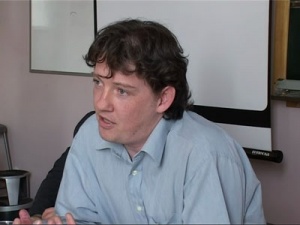
- Among the questions that face us are:
- Is Scotland distinctive or merely a local outpost of neo-liberal globalisation?
- Has social democracy survived in Scotland or is neoliberalism in the ascendant?
- What mechanisms are being used to embed market processes in the public sector?
- Can environmental justice be achieved in Scotland?
- How can privatisation and marketisation of public services be resisted?
- Is sectarianism the same as racism? Does it persist?
- How does Scotland respond to asylum and migration; What should be done?[68]
August
EU: Consultation. (ETI) SpinWatch submits evidence to the consultation. [69] A full transcript of the evidence is available here.
September 12th
UK: The Committee on Standards in Public Life publishes its Second Survey Report of public attitudes towards conduct in public life.[1]
September 18th
EU: On the back of the May 2006 Green book on European Transparency Initiative (ETI), launched by Commissioner Siim Kallas, an expert hearing entitled 'Lobbying - transparent?' is held by the European Parliament. The aim of the initiative is to:
- contribute to the increase of openness and accessibility of EU institutions, to raise awareness over the use of the EU budget and make the Union’s institutions more accountable to the public. One particular focus of the debate surrounding the ETI is lobbying transparency. In view of the EP work ahead, this hearing shall allow to MEPs to receive and consider expert opinions from different perspectives on that particular issue.[70]
Those in attendence included Commissioner Siim Kallas - European Commission; Dr William Dinan - University of Strathclyde - Scotland / ALTER-EU; Gaël du Bouëtiez- Manager of European Intermediation and member of the board the Society of European Affairs Professionals (SEAP); Elodie Fazi - Coordinator, Civil Society Contact Group & Craig Holman, Ph.D. - Capitol Hill lobbyist - US / Public Citizen.[70]
20-21 November
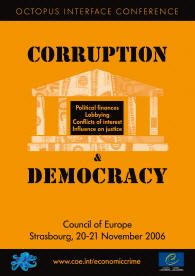
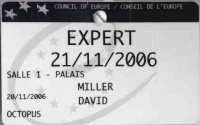
EU: The Council of Europe held a conference on 'Corruption and Democracy' which examined:
- Political finance
- Lobbying
- Conflicts of interest
- Corruption, justice and democracy
The meeting was opened by Guy De Vel (Director General of Legal Affairs of the Council of Europe), and addressed by Siim Kallas (Vice-President of the European Commission), Mikhael Grishankov (Chairman of the Anti-corruption Commission of the State Duma of the Russian Federation), Piero Grasso (National Anti-Mafia Prosecutor of Italy) and other speakers.[71] Presentations were later published in a book with three chapters on lobbying by Siim Kallas of the commission, lobbyist Rogier Chorus and academics David Miller and William Dinan.[72]
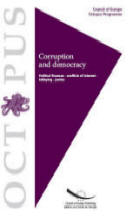
20 December 2006
EU: Letter to William Dinan from J Aguiar Machado on behalf of EU commissioner Peter Mandelson, in relation to a complaint about a European Services Forum meeting, 20 December 2006.
2007
USA: In the U.S.A., the Honest Leadership and Open Government Act comes into force. As a result, it is possible for anyone using a quick internet search to find out ‘who is lobbying whom, how much they are being paid, and whom they represent’.[73]
UK: The publication of a new ministerial code drops the requirement for meetings between ministers and lobbyists to be recorded.[73]
January 18th
UK: The Eleventh Report, ‘Review of the Electoral Commission’, is published by the Committee on Standards in Public Life.[1]
March
UK: The APPC is again forced to ‘tighten up’ its Code of Conduct. Although disclosure of clients and consultants is a condition of APPC membership, the original code of conduct failed to include a clear requirement for this information. Gill Morris, then association chair of the APPC, remarks that ‘This is an important development for the APPC and will promote greater transparency and clarity in the PA sector’. The changes were made after it emerged that lobbying firms were assuring potential clients that they adhere to the code - without actually being members of the APPC itself. The alarm was raised by Labour MP John Grogan, who later published an Early Day Motion (EDM) on lobbying, when he discovered that non-APPC agencies were telling clients that they adhere to the code, without being prepared to disclose their list of clients. Several recent tenders for consultancy firms had required adherence to the code, but not membership of the APPC, such that Bell Pottinger Public Affairs (at that point not registered with the APPC) was able to compete with Connect Public Affairs (a member) for its account with Thames Gateway London Partnership, on the grounds that both agencies followed the general principles set out in the code.[74]
March 18th
UK: Golden Arrow Communications (non-APPC) scandal: The Sunday Times revealed they had secretly recorded Golden Arrow lobbyists Ivan Henderson, a former Labour MP and David Jamieson, a former transport minister claiming that two government ministers, Stephan Ladyman and Gerry Sutcliffe were helping their business. The Sunday Times article stated:
- The lobbyists claimed Sutcliffe was prepared to hand over his private Whitehall diary to them, while Ladyman was claimed to have divulged information on policies such as road-charging. Their close relationship with Golden Arrow Communications, a London-based lobbying firm, was witnessed by an undercover reporter working for the firm.[75]
March 21st
EU: The European Commission publishes proposals for a voluntary register:
- It was suggested that a new voluntary register for lobbyists and a draft conduct was to be created, the consultation standards to be reinforced and the process towards publishing the beneficiaries of EU funds should be pursued.[76]
April 27th
UK: Rita Donaghy CBE takes over as interim chair of the Committee on Standards in Public Life.[1]
June 27th
UK: The Public Administration Committee 'today launches its inquiry into the lobbying industry. The Committee is calling for interested organisations and individuals to submit evidence to the inquiry.':
- The inquiry will be the first Parliamentary inquiry on lobbying since the 1991 report from the Select Committee on Members’ interests. In the intervening years, lobbying has been at the centre of political scandals. The cash for questions affair, amongst others, tarnished the word with the stain of sleaze. The industry responded by introducing an element of self-regulation and encouraging professionalisation of its work, but lobbying is still viewed with suspicion in some quarters.
- The inquiry will consider questions such as whether the lobbying industry requires external regulation, as has been the case in the United States for some time, and how the Government should interact with lobbyists. The Committee may also consider issues such as “cash for access” and the funding of All Party Groups by lobby firms.[77]
September 7-9
Scotland: Lobbying was among the topics discussed at a conference at Strathclyde University: Communication and Conflict: Propaganda, Spin and Lobbying (Glasgow, 7-9 September, 2007). The conference announcement stated:
- Propaganda, spin and lobbying are increasingly the topic of public and media debate. From the attempt to construct a 'threat' from Weapons of Mass Destruction, through the razzmatazz of political campaigning to the regular scandals about improper corporate influence on policy the relationship between communication, conflict and power is back on the academic research agenda.
- The conference will be an international gathering of leading experts and researchers in the area of propaganda, spin, lobbying, media management and investigative journalism. It will also feature hands on sessions on how to investigate propaganda and lobbying activities, led by SpinWatch.[78]
The Lobbying Roundtable briefing paper can be viewed here.
The Lobbying Roundtable summary paper can be viewed here.
November 29th
Scotland: Aberdeenshire Council's infrastructure services committee reject Donald Trump's plans for a £1 billion golf resort. Part of the planned golf resort would be on a protected Site of Special Scientific Interest (SSSI) and environmentalists and local residents had raised concerns over its impact on the dynamic dune system located there. The Scottish Wildlife Trust said the development would have destroyed "one of the top five dune habitats in Britain".[79]
2008
January 1st
UK: Sir Christopher Kelly becomes the new chair of the Committee on Standards in Public Life.[1]
January
UK: The Second Session of the Public Administration Select Committee (PASC) inquiry involves the submission from evidence by SpinWatch and Unlock Democracy. David Miller of SpinWatch told the MPs:
- It's clear that it is the democratic right of every interest in society to be able to access decision-makers and petition them, but it's also clear that in a democracy there ought to be some sort of level playing field.[80]
His colleague William Dinan said: 'The public have a right to know who is trying to influence policy.' However, Labour MP and committee chair Tony Wright claimed 'You don't need regulation unless there's a problem; arguing that it is not possible to 'read across the problems in one political culture to another'. Labour MP Julie Morgan remarked 'There's a real danger that you're stifling democracy with these suggestions.' Similarly, Liberal Democrat Jenny Willot suggested that the campaigners 'might be over-estimating the influence of lobbyists on MPs.' In what Singleton (2008) describes as ‘the most scathing attack’, Conservative Charles Walker said ‘You're creating a concern that simply doesn't exist’; concluding 'You're conspiracy theorists... You think there's a conspiracy on behalf of big business to corrupt democratic systems.'[80]
February 1st
UK: On 1st February, PR Week reports that ‘according to lobbyists who were following the spectacle’, campaigners calling for stringent regulation of the lobbying industry during the select committee inquiry ‘failed to win over MPs’. Immediate past president of the CIPR, Lionel Zetter, claims:
- Most members of the committee seemed to feel that the type of elaborate regulatory regime that they are advocating would be inappropriate and unnecessary in the UK.
The article concludes saying ‘the campaigners did get some support from Labour MPs Kelvin Hopkins and David Heyes’.[80]
April 24th
UK: William Dinan of the University of Strathclyde publishes a paper titled 'Learning lessons? The registration of lobbyists at the Scottish parliament: a reply to Coldwell'. The paper seeks to address criticisms of attempts to introduce a statutory register of lobbyists following the inquiry by the Standards Committee of the Scottish Parliament.[81]
The full paper can be viewed here.
May
EU: European Parliament plenary vote on the Stubb Report – mandatory, finance and names.
June
June 28th
UK: The Independent carries a front page story exposing how a senior arms lobbyist gained access to Parliament and ministers. The article states:
- A senior arms lobbyist is gaining access to ministers, MPs and peers inside Parliament using a research assistant pass allotted to a member of the House of Lords who benefits financially from one of his companies, The Independent has learnt.
- Robin Ashby, who is chairman of a defence consultancy firm that offers to ask questions of government on behalf of its clients "without your fingerprint being evident", includes among his acquaintances the Defence Secretary, the Chancellor and the Chief Whip.
- Mr Ashby's firm, Bergmans, lobbies on behalf of more than a dozen large defence and aerospace companies including BAE Systems, Northern Defence Industries, UK Defence Forum, Boeing and Rolls-Royce, which has been criticised for its past links to the Burmese regime.[82]
July
EU: European Commission register launched.
EU: SpinWatch publish the report 'Too Close for Comfort? A report on MEPs, corporate links and potential conflicts of interest'. From the Executive Summary:
- Too Close for Comfort? is an investigation into the potential conflicts of interest arising from the activities of some Members of the European Parliament (MEP), their commercial interests and links to business lobby groups. It profiles twelve MEPs whose activities illustrate these potential conflicts. They have been selected because their activities are representative of the issues, not because their behaviour is deemed extraordinary.[83]
The full report is available in pdf format here.
September 22nd

UK: The Alliance for Lobbying Transparency organised 'Will Lobbyists Come Clean?' a debate on ethics and transparency in lobbying held as a Public fringe event at the Labour Party conference 2008. On the panel were John Grogan MP; Prof David Miller, Director of SpinWatch, a member of the Alliance for Lobbying Transparency; Jon McLeod, Chairman, UK Public Affairs at Weber Shandwick; Stephen Kingston, Editor of the Salford Star, an award-winning, grassroots magazine; Chair: Nigel Pivaro, formerly played Terry Duckworth in Coronation Street, and is now a journalist. According to the Public Affairs News report of the event: 'An impassioned shouting match flared between the Association of Professional Political Consultants’ (APPC) top brass and self-proclaimed transparency campaigners at the Labour Party conference.'[84] PAN noted what it called the 'provocatively titled' ‘Will lobbyists come clean?’ and reported that the debate 'saw audience members including APPC chairman Robbie MacDuff hitting back at arguments put forward from panellists – chiefly SpinWatch’s Prof David Miller – as to why lobbyists should be more tightly regulated.'[84]
In addition to MacDuff 'APPC management board members Warwick Smith and Darren Caplan, who were all in the audience, defended self-regulation.' The report continued:
- ALT’s fringe was chaired by journalist/actor Nigel Pivaro, best known for playing Terry Duckworth in the ITV show Coronation Street. Pivaro lived up to his soap character’s feisty demeanor, at one point provoking MacDuff and his APPC colleagues by saying “Your industry is involved in a lot of shenanigans.”
- MacDuff, in particular, took such exception to this and similar comments, taking to his feet to hit out at “Daily Mail generalisations”...
- Piping up from the back row of the ALT fringe in a show of solidarity with MacDuff, fellow APPC loyalist Warwick Smith told the room: “Statutory regulation may not work better than self-regulation. With statutory regulation people try and find ways around it.” He said financial disclosure was likely to lead to “voyeurism”.
- Miller shook his head as MacDuff argued that to create a parliamentary register would create a barrier to entry to those seeking to lobby. MacDuff said: “We should shine a light onto law firms, accountancy firms, organisations of dubious purpose, rather than increasing red tape [for organisations such as APPC members].”
- Jon McLeod, UK PA chairman at Weber Shandwick – an APPC member agency – was one of the panellists at the fringe. McLeod said his US colleagues had observed that financial disclosure could lead to a “financial arms race” in which competing interests ramp up their lobbying spend when they see what the other side is spending.
- McLeod said self-regulation was “working well” and pointed out that the APPC’s self-regulatory code of conduct “doesn’t stand still”. MacDuff chimed in to describe the APPC’s disciplinary procedures as “very robust”.
- Miller wondered why organisations queue up to hire people from government roles. MacDuff responded by describing the idea that people trade on their access as “redundant”.
- John Grogan MP, who led parliamentary interest in transparency in lobbying last year, was also one of the fringe panellists, as was Stephen Kingston, editor of local paper the Salford Star. Clearly a critic of corporate power, Kingston said it was “absolutely frightening as to how big companies are in the driving seat on regeneration”.
- McLeod, seated next to Kingston on the panel, defended the use – and integrity – of ‘community consultations’ in general. The WS man was then asked directly by Kingston whether he would work for “the Salford community” for free, to which McLeod replied “yes”.
- Looking back on the debate a few days afterwards, McLeod told PAN he “was arranging to see Stephen in Salford”. As to the rowdy scenes, McLeod said: “I think we need to be less confrontational towards our critics and educate them about what public affairs is.”[84]
SpinWatch launched a guide to the lobbying industry at the event. The booklet:
- documents the tactics used by leading PR and public affairs companies on issues such as nuclear power, science, food and local government. It then takes you on a tour of leading PR companies, think tanks and corporate funded science organizations in the UK.
- Spinning the Wheels also gives an insight into lobbying, a sub-sector of the PR industry. It argues that while lobbying is a legitimate activity, the majority is undertaken by or on behalf of industry. By examining the links between personnel in commercial lobbying consultancies and politics in the UK, it reveals the enormous disparity in access and influence between the business interests able to afford their services and those lobbying in the not-for-profit sector.[85]
October 9th
UK: The Committee on Standards in Public Life publishes its Third Survey into public attitudes towards conduct in public life.[1]
November 3rd
Scotland: The Scottish Government gives its approval to Donald Trump's proposed £1 billion golf resort in Aberdeenshire. The finance secretary John Swinney stated that there was "significant economic and social benefit" in allowing the application to go ahead. The First Minister Alex Salmond said "the economic and social benefits for the north-east of Scotland substantially outweigh any environmental impact". [86]
In November 2007 Aberdeenshire Council's infrastructure services committee rejected Trump's plans for the golf resort. Part of the planned golf resort will be on a protected Site of Special Scientific Interest (SSSI) and environmentalists have raised concerns over its impact on the dynamic dune system located there.[79]
However after Aberdeenshire Council's rejection the Scottish Government called in the plans on the grounds that it "raised issues of importance requiring scrutiny at national level".[87]
November 5th
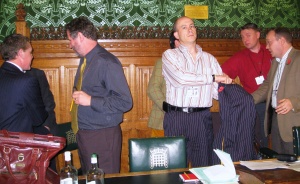
UK: The Alliance for Lobbying Transparency organised a debate in the House of Commons: 'Averting the Next Crisis: Why transparency in lobbying matters'. Chaired by David Hencke, Westminster correspondent, The Guardian, other speakers were Robbie MacDuff, Chair, Association of Professional Political Consultants, Robert Siddall, CEO, Airport Operators Association, Peter Facey, Director, Unlock Democracy and Guido Fawkes, prominent Westminster blogger.
According to a report of the meeting by former BBC journalist Nick Jones:
- Self regulation for political lobbying is currently the only show in town but the demand that lobbyists should be allowed to continue policing themselves was blown to bits at a Guy Fawkes’ night debate at the Houses of Parliament.
- Robbie MacDuff, chair of the Association of Professional Political Consultants, was assailed from all sides when he insisted that the “self-regulatory system works well and is seen to be working well”.
- The furthest MacDuff went to acknowledge the widespread disquiet was to promise that the APPC would keep its voluntary code of conduct under review and strengthen it if necessary.[88]
Jones went on to report MacDuff's attempts to defend the industry:
- MacDuff insisted that the eighty five per cent of lobbyists who were in the APPC were transparent: they registered all their clients on a quarterly basis and had no financial relationships with MPs or peers whereas charities and other organisations had access to Westminster and did not declare their sources of finance.
- He tried to counter the criticism by arguing that the APPC’s disciplinary procedures were “pretty rigorous” but they would continue to review them. “If you work as a private sector lobbyist your reputation is shot to pieces when you are exposed in the media for inappropriate behaviour and you lose clients… We try to promote the validity of lobbying which were think is legal”.
- MacDuff had effectively thrown down the gauntlet: while awaiting a report from the House of Commons Public Administration Committee into alleged abuses by the lobbying industry, the only course of action left open to campaigners for greater transparency was to accept his advice and help the news media to do more to expose the “inappropriate behaviour” of lobbyists.[88]
December 9th
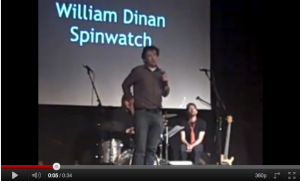
EU: The 2008 Worst EU Lobbying Awards ceremony was held at Le Bouche a Oreille, Brussels 9 December 2008. Organised by Lobbycontrol, Corporate Europe Observatory, Friends of the Earth Europe and SpinWatch, the results were as follows:
- The winners of the 2008 Worst EU Lobbying Awards have been revealed at a ceremony in Brussels today, despite a last minute attempt to gag the organisers with legal action from one of the candidates. More than 8500 people took part in the online public vote.
- One of the candidates for the Worst Conflict of Interest Award, suspended Commission official Fritz-Harald Wenig, unsuccessfully tried to silence the Worst EU Lobbying Awards last week by taking legal action in the Court of First Instance in Brussels to have his name removed from the nominations and not have his name mentioned during the Worst Lobbying Awards ceremony. The court ruled that freedom of speech was more important in this case.
- This year's Award for the Worst EU Lobbying 2008, with more than 50% of the votes, goes to a joint nomination for the agrofuel lobbyists, the Malaysian Palm Oil Council, Brazilian sugar barons UNICA and energy company Abengoa Bioenergy for their use of misleading information and greenwash. The lobbyists tried to influence crucial debates in the European Parliament and Council by claiming that agrofuels (crops used for fuel for cars and lorries) are sustainable.
- The Worst Conflict of Interest Award 2008 goes to the Finnish MEP Piia-Noora Kauppi, with 26% of the votes cast. MEP Kauppi has been promoting the interests of her future employer, a banking lobbying group, while still an active member of the European Parliament. Kauppi has consistently urged light-touch regulation for the banking sector and in January 2009 will officially be employed by the Federation of Finnish Financial Services.[89]
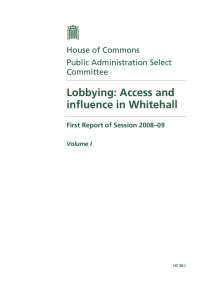

2009
January 5th
UK: The Public Administration Select Committee (PASC) of the House of Commons publishes its report Lobbying: Access and Influence in Whitehall, recommending the introduction of a mandatory register for lobbyists and measures which would ‘promote ethical behaviour by lobbyists’, ensure ‘the maximum reasonable degree of transparency’ in the process of lobbying, and make it more difficult for politicians and public servants to use information or contacts built up during their time in office ‘as an inducement to other potential employers’. Although the Committee ‘do not believe that transparency requirements are ever likely to be enforceable through self-regulation’, they suggest that there could be ‘a role for a self-regulatory organisation in promoting ethical behaviour by those involved in lobbying’. For the current situation of self-regulation to be made more effective, PASC recommended the establishment of ‘a single umbrella organisation with both corporate and individual membership, in order to be able to cover all those who are involved in lobbying as a substantial part of their work’. Furthermore, the running of the organisation should involve individuals from outside lobbying; with a clear separation between the promotion, representation and regulation of lobbying; and the introduction of more rigorous scrutiny and external validation.[90] The UK Public Affairs Committee (UK PAC) is conceived as a response to the PASC recommendations.[91]
January 27th

UK: The Alliance for Lobbying Transparency (ALT) launches its campaign in parliament ‘for the public scrutiny of the contacts between legislators and professional hustlers’ (Monbiot, 2009). Monbiot (2009) argues that this launch comes ‘with impeccable timing’:
- There's a major lobbying scandal about once a month, and no one who is aware of the government's failure to regulate this industry should be surprised. It was elected to stamp out sleaze, but since 1997 has done almost nothing.
Paul Flynn MP, one of the members of the Public Administration Select Committee who unanimously approved the call for statutory regulation of lobbyists notes Monbiot's comments on his blog and states that the views of the Alliance for Lobbying Transparency:
- greatly influenced PASC's called for a mandatory registration of all lobbyists and publications of their diaries. The lobbyists howled in rage at PASC's report. Proof enough that we had hit the spot.[92]
UK: Nick Clegg backs calls for tougher rules for peers claiming that the "erminegate" scandal revealed the "extraordinary protection enjoyed by the political class". Under the existing system the only punishment peers face for breaking rules on lobbying was being made to apologise for their actions. Nick Clegg said that this resulted in there being "one rule for lawmakers and another for everyone else".[93]
The "erminegate" affair came about after a Sunday Times investigation. Journalists from the Sunday Times posed as lobbyists and met with peers and seeked to have a foreign retail business exempted from business rates. Their conversations with peers were secretly recorded and this led to a Lords Privileges Committee investigation into the peers actions. Both Lord Truscott and Lord Taylor of Blackburn were found to have been willing to provide help to amend laws in exchange for money.[94]
January 29th
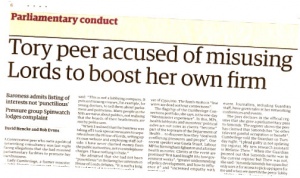
UK: The Guardian report that a Tory peer, Lady Cumberlege, allegedly used the House of Lords to boost her own firm:
- A Conservative peer who owns a political networking consultancy was last night facing allegations that she had misused parliamentary facilities to promote her own business.
- Lady Cumberlege, a former minister in John Major's government, yesterday admitted failing to declare "punctiliously" her financial interests during House of Lords debates.
- The peer's firm, Cumberlege Connections, runs courses and conferences in which clients involved in healthcare pay to learn more about how Westminister and Whitehall operates. The firm says it "works extensively with the NHS, regulatory organisations and the pharmaceutical industry".
- Cumberlege faces further allegations about the use of a Lords email address to recruit people to commercial courses her firm was organising, and about giving her business partner a Lords access pass.
- She also faces allegations of failing to declare her business partner's financial interests in an official anti-sleaze register. Under the Lords' rules, anyone given a parliamentary pass must declare any employment or financial interest in a business involved in lobbying.[95]
Spinwatch, who uncovered the Cumberledge case, stated they would lodge a complaint with the panel of peers over the issue:
- Spinwatch's spokesman, David Miller, said : "No peer should be treating parliament as an office from which to do commercial business, and we will be making a complaint to the relevant authority. The fact that we don't know who Cumberlege's clients are – especially commercial health companies – is also a concern and underlines the fundamental need for greater transparency."[95]
January 31st
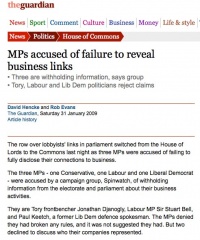
UK: SpinWatch accuses three MPs of withholding business related information from the electorate and parliament. The Guardian reports:
- The row over lobbyists' links in parliament switched from the House of Lords to the Commons last night as three MPs were accused of failing to fully disclose their connections to business.
- The three MPs - one Conservative, one Labour and one Liberal Democrat - were accused by a campaign group, SpinWatch, of withholding information from the electorate and parliament about their business activities. [96]

UK: The Daily Mail report that some peers from the House of Lords are offering their services as conference and after-dinner speakers for up to £25,000. The Daily Mail reports:
- But because of a loophole in the law, the Lords do not have to declare how much they make from socialising with bankers, industrialists and other professionals.
- By contrast, MPs are forced to reveal any income above £630 they receive from speaking engagements in a single year.
- Research by the Mail has uncovered 18 peers advertising their services on websites for after-dinner speakers.
- However, only three of them declare these commercial activities on their Register of Interests.[97]
February
UK: Full-page advertisement for the ALT published in The Times. Headed 'Parliamentary Access' the with strap line 'putting the cash into politics' the ad stated: 'Don't let cumbersome democracy get you down. Buy yourself influence with Parliamentary Access'. The ad urged people to ask their MP to support the 'introduction of a mandatory register of lobbying activity'.
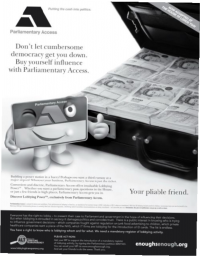
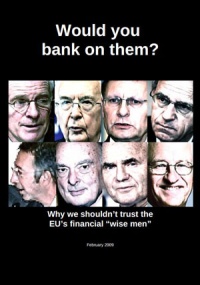
EU: The report 'Would you bank on them? Why we shouldn’t trust the EU’s financial “wise men”' is published by the Corporate Europe Observatory (CEO). From the reports Executive Summary:
- In the EU, the Commission and the Council has set up a High Level Group of eight experts to advise them on how to reform the financial system in terms of supervision and regulation. Given the now obvious failings of the current system and individual financial sector institutions, it would seem prudent to seek advice from a diversity of sources, including from independent experts who had expressed concern about the flaws in the current financial architecture.
- However, the group - named the de Larosière Group after its chairman - is comprised of people closely linked to the financial industry, or to institutions that, to a greater or lesser extent, have been implicated in the crisis.[98]
The full report may be downloaded in pdf format here.
April
EU: Joint EP-EC register ‘portal’
May
UK: 38 Degrees – named after the angle at which an avalanche happens - is launched with their campaign for a Recall Law. Inspired by similar campaigning movements such as the US-based MoveOn.org and global campaigners Avaaz.org, 38 Degrees aim to use the latest technologies to allow the public to take effective action as part of ongoing campaigns.[99]
UK: SpinProfiles (later called Powerbase) is launched by SpinWatch in May 2009. It aims to catalogue organisations and individuals involved in managing public debate.
May 2nd
World / UK: A report looking into the phenomenon of the 'revolving door', with a particular reference to the financial crisis, is published by authors David Miller and William Dinan. According to the report Britain has a greater culture of cronyism than Europe or the US. Scotland on Sunday reports:
- The research looked at so-called "revolving door connections", when a company employs former or current politicians, civil servants or members of regulatory bodies, or where individuals move from the financial sector into politics, Government or regulatory bodies.
- Barclays was the most connected British-based company with 14 revolving door connections.
- Two of the Barclays examples were Mark Clarke and Sarah Cox. Clarke is director general of finance at the Department for Business, Enterprise and Regulatory Reform, but worked at Barclays from 2000 to 2003. Cox was an international consultant at Barclays from 2001 to 2004 and has since joined the UK Cabinet Office's business support group.
- "The Government and the political classes have very close links to the banking industry," said the report's author David Miller, a Professor of Sociology at Strathclyde University, who specialises in researching lobbying.
- "I believe this could be one of the factors behind the disaster that has befallen the financial markets. There has not been enough regulation of these connections."[100]
The full text of 'Revolving Doors, Accountability and Transparency - Emerging Regulatory Concerns and Policy Solutionsin the Financial Crisis ' can be viewed here.
May 25th

North America / EU: The European Union Center of Excellence at the University de Montreal hold a transatlantic workshop entitled 'Regulating Ethics and Lobbying: What Can Europe And North America Learn from Each Other?'. The selected speakers and subjects were:
European Perspectives on Ethics Regulation and Lobbying
- Thomas Henökl, European Institute of Public Administration, The Netherlands: Regulating Conflicts of Interest: Comparative Study of the Rules and Standards of Professional Ethics for Holders of Public Office in the EU 27
- William Dinan, Department of Sociology, University of Stratchclyde, spoke-person for ALTER-EU (Alliance for Transparency and Ethics Regulation): Bursting the Bubble: Lobbying transparency and regulation in Europe
North American Experiences
- André C. Côté, Commissaire au lobbying du Québec
- Andrew Stark, Rotman School of Management, University of Toronto: The Ethics of Lobbying in America: Some New Gray Areas
- Pierre Ricard-Desjardins, Office of the Commissioner of Lobbying of Canada: The Canadian Lobbying Act
Transatlantic Comparisons
- Christine Mahoney, Political Science, Syracuse University: Brussels versus the Beltway: Corporate Lobbying Influence in the US and the EU
- Craig Holman, Government Affairs Lobbyist, Public Citizen, Washington: Lobbying Reform in the United States and the European Union: An Attitudinal Survey of the Progress on Two Continents[101]
June
UK: The National Council for Voluntary Organisations (NCVO) dismisses UK PAC's proposals for a self-regulating lobby register; citing the fact that charities are different from organisations in the private sector and already regulated by the Charity Commission. The NCVO is, however, supportive of government proposals for a statutory register; proposals which are themselves to be based on the work of UK PAC. Chloe Stables, Parliamentary Officer of the NCVO, states that the NCVO will continue to work with UK PAC ‘to show how its register would impact on the Government's own plans, and now we will continue to work with it as it takes forward a statutory register’. Leigh Daynes, Plan UK Director of Communications, disagrees with the position of the NCVO, stating ‘I'm not sure how a register would work, and we do have umbrella organisations such as NCVO, so we would want to avoid duplication and waste’.[102]
July 2nd
UK: Six months after the publication of its long-awaited report into lobbying, the PASC holds a session with representatives from the APPC, PRCA and CIPR Government Affairs Group (GAG) at Portcullis House, Westminster; in a move which Hall (2009) suggests ‘is being interpreted by industry observers as a sign from the committee… that its members are getting fed up with waiting and want a government response sooner rather than later’. Also invited to attend are a representative of the ‘Public Affairs Council Working Party’ and representatives from the Alliance for Lobbying Transparency (ALT), Unlock Democracy and Friends of the Earth.[103]
August 9th

UK: The Times reveals that "50 prospective candidates chosen by the main parties are already working as lobbyists and public relations executives and are deeply enmeshed in the world of spin and politics."[104]
September
UK: The shadow minister for the Cabinet Office, Conservative MP Francis Maude, declares that lobbying firms should publish their client lists and details of their full- and part-time staff, warning that ‘If the industry fails to self-regulate, it should be prepared for legislation that will ensure greater accountability’.[105] Responding to these threats about the possible future introduction of tougher legislation, chair of the APPC Robbie MacDuff remarks:
- I think Maude's comments have been noted by a significant group of lobbyists outside of self-regulation at the moment. Sometimes it takes this kind of political interest to move forward those who have been resistant to taking seriously issues around accountability, transparency and openness.[105]
SpinWatch spokesperson David Miller comments ‘We are a bit sceptical about the plans. We think this is the Tories being soft on lobbyists’.
Director of DLA Piper, Eben Black, welcomes additional Tory pronouncements on amending the solicitors’ code of conduct allowing solicitors’ firms that engage in lobbying to disclose their lobbying clients without breaching the code. Black remarks ‘We have been calling consistently for a statutory register’.[105]
October
UK: The government dismisses the PASC recommendations for a statutory register, arguing that the industry should be allowed to self-regulate. The government did accept the recommendation that all departments publish online quarterly reports outlining the details of ministerial meetings with external groups and hospitality received by ministers and advisers; and an extension to the list of civil servants required to publish details of their own hospitality and expenses details. However, the suggestion that details of meetings between officials and external groups should be published was rejected; and the government failed to suggest a timeframe within which the efficacy of industry self-regulation will be assessed.[106] PASC’s chair, Dr Tony Wright MP, remarked that he was disappointed that the government had dismissed the idea of a statutory register; but maintained ‘this is where I think we will eventually end up’. Suggesting that ‘self-regulation is no regulation’, David Miller of the Alliance for Lobbying Transparency commented that asking the public to trust lobbyists to operate transparently is akin to ‘asking us to trust MPs on expenses’. He added:
- The government has dropped the ball on political reform and ignored public concerns by refusing to force lobbyists to operate in the open. In June, Gordon Brown said that the future was about opening up areas of public life that have been too secretive. This must include the massive and growing influence commercial lobbying has on public life.[106]
October 2nd
UK: David Singleton of PR Week reports that APPC chairman Robbie MacDuff believes that the recent Conservative Party announcement that public affair firms should publish full client lists are encouraging non-APPC firms to commit to greater transparency and openness.
From PR Week:
- Shadow minister for the Cabinet Office Francis Maude declared last week that public affairs firms should publish all client lists and their full-time and part-time staff.
- 'If the industry fails to self-regulate, it should be prepared for legislation that will ensure greater accountability,' warned Maude.[107]
However David Miller of SpinWatch stated 'We are a bit sceptical about the plans. We think this is the Tories being soft on lobbyists.'[107]
October 4th
Scotland: Private correspondence released under a freedom of information request reveals that lawyers representing Donald Trump threatened to sue Aberdeenshire Council over its "flawed decision-making process" after it rejected the develpoment at Menie Estate near Balmedie in 2007. The Sunday Herald reports:
- In the first letter, dated November 30, 2007, Faulds (Trump's lawyer) urged the council to reconsider its decision, arguing that the public opposition it had generated was a "new material consideration". In the second, on December 3, 2007, she said failure to reconsider the application would "result in a flawed decision-making process".
- "I must advise you that my client will take all necessary steps to ensure that the council's decision-making process is intra vires [within its powers], reasonable and appropriate in the circumstances," Faulds wrote.
- In the third letter, also dated December 3, 2007, Faulds said she had been instructed by the Trump organisation to undertake a "legal audit" of the council's decision-making process. She asked to see seven sets of documents on the council's structure, committees and standing orders "as a matter of urgency".[108]
David Miller of SpinWatch said "Behind-the-scenes lobbying and strong-arm tactics may be the way politics is played in the US, but it should have no place in Scotland."[108]
Colin Millar, a former Aberdeenshire council covener, said he was "ashamed" that the council did not remove the threat of compulsory purchase orders (CPO) from local residents who lived within Donald Trump's north-east estate. Millar said "What has happened to Liberal Democrat support for human rights? I was ashamed of my former councillor and Lib Dem colleagues."[109]
October 25th
Scotland: SpinWatch accuse Aberdeenshire Council of being 'too close' to Donald Trump and his planned £1 billion golf resort. Letters released under freedom of information laws reveal that Dr Christine Gore, the council's senior planning officer informed lawyers acting on behalf of Donald Trump that "close liaison" would be needed to "manage" any negative publicity that may arise due to the use of ompulsory purchase orders (CPOs). David Miller of SpinWatch said "The question of probity and governance is raised by these documents," said Miller. "The council is supposed to protect the public interest, not the private interests of a major corporation. These documents suggest Aberdeenshire council is too close to the Trump Organisation."[110]
November

EU: ALTER EU publishes a report entitled 'A Captive Commission: the role of the financial industry in shaping EU regulation'
UK: The Twelfth Report, ‘MPs' expenses and allowances: Supporting Parliament, safeguarding the taxpayer’, of the Committee on Standards in Public Life is published.[1] Sir Philip Mawer - who from 2002 until 2008 was parliamentary commissioner for standards - agrees to chair an ‘implementation team’ for the new umbrella body UKPAC.[111]
EU/International: ALTER EU submits evidence to the OECD consultation on the 'Draft Principles fro Transparency and Integrity in Lobbying'.[112]
The document nods to the experience in the EU and in Scotland and the UK:
- We note that the OECD draft principles were ‘developed in parallel with the Green Paper of the European Transparency Initiative and the Code of Conduct for Interest Representatives developed by the European Commission’. ALTER EU’s response to the draft principles is informed by our active role in the ongoing debate in Brussels on the European Transparency Initiative. Our response also draws upon lessons we have taken from our member organisations across the EU on the challenges of making lobbying more transparent and accountable.[112]
It concludes that voluntary approaches to lobbying regulation are untenable:
- One can only conclude that there remain serious problems in relation to lobbying transparency: the mismatch between public perceptions of lobbying (i.e. that there are frequent problems and instances of inappropriate lobbying) and self-regulatory oversight (i.e. there are hardly ever any problems with lobbying) suggests that independent and verifiable means of assessing lobbying processes and practices are urgently required.[112]
The full document of ALTER EU's response is available here.
November 4th
Scotland: The Times reveals that close links between the Prince of Wales's sustainable architecture charity, The Prince's Foundation for the Built Environment, and Scotia Homes raise serious questions about the independence of the foundation. The Times reports:
- The developer commissions and pays for the foundation to go into towns and villages, carry out consultations and prepare master plans for the local communities, as well as to help to persuade authorities of their merits.
- One proposed estate requires the chopping down of parts of a wood teeming with red squirrels. Another would appear to cut off a pathway used by deer to get from a hillside in the Cairngorm Mountains, in the Scottish Highlands, to the River Dee.
- The Prince's Foundation went so far as to record a formal objection to planners in a national park for permitting too few houses to be constructed on a greenfield site where the developers want to build.
- David Miller, of the Alliance for Lobbying Transparency, said: "The fact that the foundation is funded by the interests they are promoting fatally undermines any claim they might have to be a neutral and disinterested party promoting good works."[113]
December 15

Naomi Klein presents the Angry Mermaid Awards 2009. The 'winner' of the 2009 award was Monsanto with 37% of the votes cast.
The Angry Mermaid Award was set up to "recognise the perverse role of corporate lobbyists, and highlight those business groups and companies that have made the greatest effort to sabotage the climate talks, and other climate measures, while promoting, often profitable, false solutions."[114]
Notes
- ↑ 1.00 1.01 1.02 1.03 1.04 1.05 1.06 1.07 1.08 1.09 1.10 1.11 1.12 1.13 'History of the Committee', Committee on Standards in Public Life, 2010
- ↑ 2.0 2.1 Standards Committee Lobbying in the Scottish Parliament Standards Committee Consultation Paper SP Paper 200 Session 1 (2000)
- ↑ Miller, David and Schlesinger, P. and Dinan, W. (2000) Submission to standards committee consultation on lobbying the Scottish Parliament, 5 December. Discussion paper. Scottish Parliament, Edinburgh, UK. (Unpublished)
- ↑ Douglas Fraser, 'Mound more secretive than Westminster: Academics reveal the true extent of silent power at Scottish parliament', Sunday Herald, Jan 14 2001.
- ↑ 5.0 5.1 SCOTTISH CODES OF CONDUCT - BEN BOLD REPORTS ON MOVES TO ENSURE SCOTTISH PARLIAMENT IS WIPING THE LOBBYING SLATE CLEAN PR Week February 2, 2001 Pg. 14
- ↑ 6.0 6.1 Ian Coldwell 'Lobbyists Don't Letter in the Sunday Herald, 21 January 2001
- ↑ David Miller, William Dinan and Philip Schlesinger Media Research Institute, 'Inner lobby life', Sunday Herald Readers Views, January 28, 2001, Pg. 8
- ↑ Ben Bold, 'Scottish codes of conduct - Ben Bold reports on moves to ensure Scottish Parliament is wiping the lobbying slate clean', PR Week UK, 2 February 2001.
- ↑ Simon Nayyar, 'Standards Committee Inquiry into Lobbying in the Scottish Parliament', PRCA - Letter to SMRI, 23 February 2001.
- ↑ Scottish Parliament Standards Committee Official Report Meeting 3, 2001, Wednesday 28 February 2001
- ↑ ESRC Political Communication and the Scottish Parliament Start date: 01 April 1999 End date: 31 December 1999
- ↑ 12.0 12.1 Edinburgh University Press Open Scotland? Journalists, Spin Doctors and Lobbyists, accessed 17 September 2011
- ↑ 13.0 13.1 13.2 13.3 William Dinan, David Miller and Philip Schlesinger, 'Supplementary Evidence to Standards Committee Consultation on Lobbying the Scottish Parliament', Stirling Media Research Institute, University of Stirling, March 2001.
- ↑ John Innes, 'Academics call for lobby groups to be regulated', The Scotsman, 1 March 2001.
- ↑ Olga Wojtas, 'Stirling confronts mistrust of politics', Times Higher Education, 9 March 2001.
- ↑ 'On your lobby-horse', The Times Higher Education Supplement, 9 March 2001.
- ↑ Juliette Garside, 'Is our view of ministers being blurred by presenters' tips?', Sunday Herald, 18 March 2001.
- ↑ Douglas Fraser. 'Whisper it... we're still a secret society. Devolution was supposed to herald a more open and accountable parliament. Instead it is just as reluctant to reveal the truth as Westminster', Sunday Herald, New focus, Mar 25 2001.
- ↑ 19.0 19.1 19.2 19.3 19.4 'Unreal world: Empirical research is more and more sidelined in favour of grand theory. Three Scottish academics show what can be done if you're prepared to examine the real world. John Crace reports' The Guardian Education: Higher, Tuesday March 27, 2001.
- ↑ Arnold Kemp, 'When spin takes over', The Observer, 8 April 2001.
- ↑ Peter Preston, 'The break-up of Britain', 23 April 2001.
- ↑ 22.0 22.1 Standards Committee Consultation Paper: Statutory Registration of Commercial Lobbyists June 2001 Session 1 (2001)
- ↑ Ian Hargreaves, 'OPEN SCOTLAND? JOURNALISTS, SPIN DOCTORS AND LOBBYISTS', 11 June 2001.
- ↑ Prof. Justin Greenwood, Statutory Registration of Commercial Lobbyists, 16 July 2001.
- ↑ Michelle Perry, 'Fears grow over 'lobbyist' firms', Accountancy Age, 16 August 2001.
- ↑ 26.0 26.1 26.2 Dr. David Miller, William Dinan and Professor Philip Schlesinger, Response to the Standards Committee Consultation paper Statutory Registration of Commercial Lobbyists, June 2001, Stirling Media Research Institute, Stirling University, Stirling FK9 4LA August 2001
- ↑ 'Scottish PA consultants watch out', PR Week, 17 August 2001.
- ↑ Joe Lepper, 'Scots Parliament lobbying conduct code in quandary', 17 August 2001.
- ↑ Neil Mackay 'Rogue lobbyists could face prison', Sunday Herald, 19 August 2001, p.2
- ↑ David Scott, 'CALL TO MAKE POLITICIANS' DIARIES AVAILABLE FOR PUBLIC SCRUTINY', The Scotsman, pg. 8, 20 August 2001.
- ↑ Dr. David Miller, William Dinan and Prof. Philip Schlesinger, 'Essential to regulate lobbyists', The Scotsman, 22 August 2001.
- ↑ Dr. David Miller, William Dinan and Professor Philip Schlesinger, 'Why lobbyists need to be scrutinised', The Herald (Glasgow), 22 August 2001.
- ↑ Robert M Armstrong, 'Facts of life in running trade associations', 24 August 2001.
- ↑ Jack Irvine, 'Glaring inequality in proposals for lobbyists', The Herald (Glasgow), 24 August 2001.
- ↑ Ian Coldwell, 'Porridge lobbying', Sunday Herald, 26 August 2001, p. 8
- ↑ Ian Coldwell, 'Lobbying curbs', The Scotsman, 27 August 2001.
- ↑ Dr. David Miller, William Dinan and Professor Philip Schlesinger, 'Task of ensuring openness in public life', The Herald (Glasgow), August 29, 2001, Pg. 17.
- ↑ David Miller, William Dinan and Philip Schlesinger, 'Lobby industry', The Scotsman, 30 August 2001.
- ↑ Iain D Duff, 'Against regulation', The Scotsman, 1 September 2001.
- ↑ Sunday Herald 'Lobbying debate' Readers Views 2 September 2001, Dr. David Miller, William Dinan and Professor Philip Schlesinger, Stirling Media Research Institute
- ↑ David Miller, William Dinan, Philip Schlesinger, 'Rearguard action', The Scotsman, 6 September 2001.
- ↑ Jason Allardyce and Brian Brady, 'God on their side?', Scotland on Sunday, 12 May 2002.
- ↑ Jason Allardyce, 'Christians plot political infiltration', Scotland on Sunday, 12 May 2002.
- ↑ Row erupts over trip to States Daily Telegraph, 10:38AM BST 29 Jun 2002
- ↑ 7 October 2002; See also David Miller (2002) 'A question of privilege', Scottish Left Review, Issue 13 November/December: 12-13.
- ↑ ESRC Broadcast details Title Good morning Scotland Description Interview on the Scottish Parliament Business Exchange 08 October 2002Corporate Public Relations in British and Multinational Corporations Grant reference: R000238993
- ↑ William Dinan, 'Open Scotlands Executive', Spinwatch, 21 October 2002.
- ↑ David Miller, 'Unspinning the globe', Red Pepper magazine, 1 January 2003.
- ↑ David Miller, 'System failure : it's not just the media, it's the whole bloody system', Goldsmiths College, University of London Thursday 6th November 2003.
- ↑ Jempson, M. 'Spinners or sinners? PR, journalists and public trust’, Journal of Communication Management, 9(3): 267-276, 2005.
- ↑ Keeble, R. L. 'Journalism as political practice: A new, radical look at media ethics', 2009: 10.
- ↑ David Miller, 'Taking The Risk Out Of Devolution Scoop', Monday, 6 September 2004.
- ↑ CPBF Spin and Corporate Power: Seminar at Strathclyde University, 18/9 Nov. 2004, Accessed 19 September 2011
- ↑ Spinwatch gets a great launch, Free Press, No. 143, November-December 2004, p. 3.
- ↑ 55.0 55.1 PR Week (2004) ‘Diary: SpinWatch spins own website launch’ PR Week UK, 26.11.04
- ↑ 'The ALTER-EU Coalition’, ALTER-EU, 2010.
- ↑ David Miller and William Dinan, Re: European Transparency Initiative, Letter to Commissioner Siim Kallas, 27 April 2005
- ↑ 58.0 58.1 Diary: Anti-spinners set for Edinburgh tour PR Week UK, 01 July 2005, 4:45pm
- ↑ SpinWalk in Edinburgh announced, Red Pepper, Make the G8 History Blog, Tuesday, 28 June 2005
- ↑ Lobbycontrol Europäische NGOs fordern mehr Lobby Transparenz in der EU 20. Juli 2005 | Ein Kommentar
- ↑ Dinan, W. 'Bursting the Bubble: Lobbying transparency and regulation in Europe’, Presented at the ‘Regulating Ethics and Lobbying: What Can Europe and North America Learn from Each Other?', transatlantic workshop at the European Union Center of Excellence, Université de Montréal, 25.05.09.
- ↑ 62.0 62.1 , ‘About ALTER-EU’, ALTER-EU, 2010.
- ↑ 'Lobbying: Access and influence in Whitehall - Public Administration Committee', House of Commons - Public Administration Committee, Spetember 2007
- ↑ Chandiramani, R. accessedhttp://www.conservatives.com/~/media/Files/Downloadable%20Files/agreement.ashx?dl=true 'APPC to toughen code of practice', PR Week UK, 10.11.05.
- ↑ David Miller, 'Nuclear view: spin doctor defends lying', SpinWatch, 28 March 2006.
- ↑ Robbie Dinwoodie, 'Greens: science briefings could be biased by business', The Herald, 14 April 2006.
- ↑ 'Green Paper - European Transparency Initiative', European Union - Europa, 2006
- ↑ Big Blether email list Neoliberal Scotland?: Rethinking Scotland in the global context Department of Geography & Sociology, University of Strathclyde Glasgow, 21st to 22nd May 2006.
- ↑ SpinWatch August 2006 European Transparency Initiative: Consultation Response by William Dinan and David Miller for SpinWatch.
- ↑ 70.0 70.1 'Expert Hearing: Invitation: Lobbying - transparent?', Communication Director - European Parliament
- ↑ Council of Europe Octopus Interface 2006 Conference on “Corruption and Democracy" 20-21 November 2006, Palais de l’Europe, Strasbourg, France
- ↑ Corruption and democracy: Political finances - conflicts of interest - lobbying - justice , Strasbourg: Council of Europe.
- ↑ 73.0 73.1 George Monbiot, 'This lobbying scandal confirms it. The dying days of Labour are upon us', The Guardian, 27 January 2009
- ↑ Singleton, D. 'APPC writes disclosure requirement into Code', PR Week UK, 14.03.07.
- ↑ Claire Newell and Robert Winnett, 'Labour’s lobby scandal', The Sunday Times, 18 March 2007.
- ↑ 'European Transparency Initiative', European Healthcare Fraud & Corruption Network.
- ↑ Parliament PASC launches lobbying inquiry Press Notice 38, Session 2006-07, 21 June 2007
- ↑ War and the Media Network Communication and Conflict: Propaganda, Spin and Lobbying Strathclyde University, Glasgow, 7-9 September, 2007
- ↑ 79.0 79.1 'Scottish councillors reject Trump's £1bn golf course', The Guardian, 29 November 2007.
- ↑ 80.0 80.1 80.2 Singleton, D. 'Campaigners get a rough ride from MPs at select committee', PR Week UK, 31.01.08.
- ↑ William Dinan, (2006) "Learning lessons? The registration of lobbyists at the Scottish parliament: A reply to Coldwell", Journal of Communication Management, Vol. 10 Iss: 1, pp.55 - 66.
- ↑ James Macintyre, 'Exposed: the arms lobbyist in Parliament', The Independent, 28 June 2008.
- ↑ Andy Rowell, 'Too Close for Comfort? A report on MEPs, corporate links and potential conflicts of interest', Spinwatch, July 2008.
- ↑ 84.0 84.1 84.2 Ian Hall, Stand-up row at Labour fringe, Public Affairs News 23rd October 2008
- ↑ Campaign for Press and Broadcasting Freedom New pamphlet from SpinWatch: Spinning the Wheels DATELINE: 7/10/08
- ↑ Haroon Siddique, 'Trump triumphs in battle for Scottish golf resort', The Guardian, 3 November 2008.
- ↑ Bob Ward, 'You've Been Trumped: film reveals tycoon's ruthless efforts to build Scottish golf resort', The Guardian, 13 September 2011.
- ↑ 88.0 88.1 Nicholas Jones, Self-regulation of political lobbying “blown to bits” in Westminster debate. Spinwatch,November 6, 2008
- ↑ Friends of the Earth Europe Agrofuels lobby and Finnish MEP disgraced at Worst EU Lobbying Awards ceremony Press Release, 9 December 2008 For immediate release
- ↑ 'Lobbying: Access and Influence in Whitehall - First Report of Session 2008-2009', House of Commons: Public Administration Select Committee, 2010
- ↑ 'What is United Kingdom Public Affairs Council (UKPAC)?', Chartered Institute of Public Relations, 2010.
- ↑ Paul Flynn, [http://paulflynnmp.typepad.com/my_weblog/2009/01/fares-for-votes.html 'Reform Boost', Read my day: Solid blogging, 27 January 6.01PM 2009.
- ↑ David Hencke, Robert Booth and Andrew Sparrow, 'Lib Dems back calls to toughen up House of Lords regulation', The Guardian, 27 January 2009.
- ↑ 'Erminegate', BBC.
- ↑ 95.0 95.1 David Hencke and Rob Evans, 'Tory peer accused of misusing Lords to boost her own firm', The Guardian, 29 January 2009.
- ↑ David Hencke and Rob Evans, 'MPs accused of failure to reveal business links', The Guardian, 31 January 2009.
- ↑ Colin Fernandez, 'The peers for hire at £25,000 a time...', The Daily Mail, 31 January 2009.
- ↑ Kenneth Haar, Andy Rowell and Yiorgos Vassalos, 'Would you bank on them? Why we shouldn’t trust the EU’s financial “wise men”', Corporate Europe Observatory, February 2009.
- ↑ 'About 38 Degrees', 38 Degrees.
- ↑ Tom Peterkin, 'Study reveals true extent of 'old boys network' between Government and banks', Scotland on Sunday, 2 May 2009.
- ↑ 'Regulating Ethics and Lobbying: What Can Europe And North America Learn from Each Other? Transatlantic workshop', University de Montreal, 25 May 2009.
- ↑ Cartmell, M. 'NCVO backs lobby register', PR Week UK, 09.06.10
- ↑ Hall, I. 'PASC calls one-off session to discuss regulation of lobbyists', Public Affairs News, 26.06.09.
- ↑ Marie Woolf, 'Spin doctors swoop on 'safe' Tory seats', The Times, August 9 2009.
- ↑ 105.0 105.1 105.2 Singleton, D. 'Industry reacts to Tories’ tough talk', PR Week UK, 02.10.09.
- ↑ 106.0 106.1 Mason, T. 'Government rejects call for lobbying register', Civil Society, 27.10.09
- ↑ 107.0 107.1 David Singleton, 'Industry reacts to Tories' tough talk', PR Week, 2 October 2009.
- ↑ 108.0 108.1 Rob Edwards, 'Trump 'threatened to sue' over refusal to back golf resort; Tycoon accused of 'strong-arm' tactics against council', Sunday Herald, 4 October 2009
- ↑ Gillian Bell, 'Ex-convener 'ashamed of council' over Trump vote', Aberdeen Press and Journal, 5 October 2009.
- ↑ Mark Macaskill, 'Critics claim council 'too close' to Trump', The Sunday Times, 25 October 2009.
- ↑ PAN Staff, 'Sir Philip Mawer confirmed as chairman of ‘implementation team' for UK Public Affairs Council', Public Affairs News, 16 November 2009.
- ↑ 112.0 112.1 112.2 William Dinan, OECD Consultation on the draft Principles for Transparency and Integrity in Lobbying ALTER EU response November 2009
- ↑ Dominic Kennedy, 'Prince's charity and the builders blazing a Highlands trail', The Times, 4 November 2009.
- ↑ 'Welcome to the Angry Mermaid Award', Angry Mermaid Awards website.
